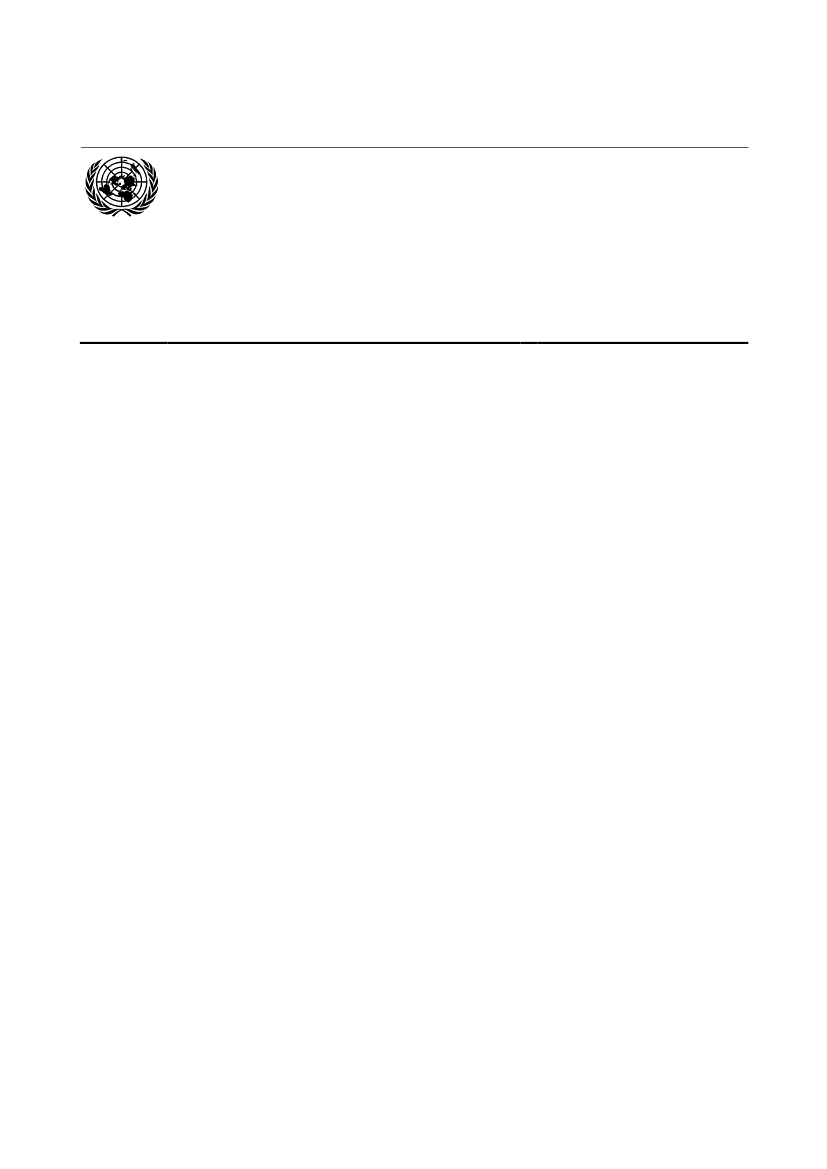Det Udenrigspolitiske Nævn 2004-05 (2. samling)
Bilag 11
Offentligt
United Nations
A/59/710Distr.: General24 March 2005Original: English
General Assembly
Fifty-ninth sessionAgenda item 77Comprehensive review of the whole questionof peacekeeping operations in all their aspects
Letter dated 24 March 2005 from the Secretary-General to thePresident of the General AssemblyUnited Nations peacekeeping operations have for decades brought peace andstability to countries emerging from war. The women and men who serve the blueflag do so under arduous and often dangerous conditions. The history ofpeacekeeping has been one of distinguished collective accomplishment and personalsacrifice.However, this exemplary record has been clouded by the unconscionableconduct of a few individuals. In particular, the revelations in 2004 of sexualexploitation and abuse by a significant number of United Nations peacekeepingpersonnel in the Democratic Republic of the Congo have done great harm to thename of peacekeeping. Such abhorrent acts are a violation of the fundamental dutyof care that all United Nations peacekeeping personnel owe to the local populationthat they are sent to serve.As the allegations in the Democratic Republic of the Congo surfaced, itbecame clear that the measures currently in place to address sexual exploitation andabuse in peacekeeping operations were manifestly inadequate and that afundamental change in approach was needed. I began a process of review todetermine the nature and extent of the problem and resolve it. As a first step, in July2004, I invited His Royal Highness Prince Zeid Ra’ad Zeid Al-Hussein, PermanentRepresentative of Jordan, to act as my adviser and assist me in addressing theproblem of sexual exploitation and abuse by United Nations peacekeepingpersonnel. As the Permanent Representative of a major troop- and police-contributing country and a former civilian peacekeeper, Prince Zeid has brought avital perspective to the problem and potential solutions. Thus, when the SpecialCommittee on Peacekeeping Operations, in its 2005 report (A/59/19), requested meto make available a comprehensive report with recommendations on sexualexploitation and abuse by United Nations peacekeeping personnel, I asked PrinceZeid to undertake its preparation. This report I now submit to you. I would begrateful if it could be made available to the members of the General Assembly.
05-24790 (E)
230305
*0524790*
A/59/710
The report before you represents the first comprehensive analysis of theproblem of sexual exploitation and abuse by United Nations peacekeepingpersonnel. It contains bold recommendations directed at both the Secretariat andMember States. In formulating the recommendations, Prince Zeid drew on extensiveconsultations with Secretariat officials and representatives of the troop- and police-contributing countries that provide the most military and police personnel, as well ason insights from a visit to the United Nations peacekeeping operation in theDemocratic Republic of the Congo from 24 October to 3 November 2004.I believe that Prince Zeid’s analysis is a fair and honest account of a seriousproblem. I concur fully with all recommendations relating to the report’s four mainareas of concern:• The current rules on standards of conduct• The investigative process• Organizational, managerial and command responsibility• Individual disciplinary, financial and criminal accountabilityResolving the problem of sexual exploitation and abuse by United Nationspeacekeeping personnel is a shared responsibility and can only succeed with firmcommitment and action by both the Secretariat and Member States. We will need towork closely together and chart a common way forward. I undertake to do myutmost to implement the necessary reforms under my purview, which would go farbeyond the initial steps that have been taken to raise awareness in peacekeepingoperations of United Nations standards of conduct and to enforce them. I also callupon Member States to act with determination and due haste and to provide thenecessary resources to the Secretariat and the United Nations agencies, funds andprogrammes to put in place the important changes required.The implementation of the report’s recommendations will strengthen theability of peacekeeping operations to promote good conduct and discipline morebroadly and increase the accountability of managers and officers in this area. Sincethe problem of sexual exploitation and abuse is not confined to peacekeepingcontexts, the report also offers many innovative ideas that could be applicable to thewider United Nations system.United Nations peacekeeping is a noble calling and serves as an integral partof the world’s efforts to maintain peace and security. Sexual exploitation and abuseby peacekeeping personnel must first be eliminated and then prevented fromhappening again. I would like to express my sincere thanks and appreciation toPrince Zeid for producing this report, which I trust will be the starting point to driveforward a process of reform that will achieve this goal.(Signed) KofiAnnan
2
A/59/710
A comprehensive strategy to eliminate future sexualexploitation and abuse in United Nationspeacekeeping operationsContentsParagraphsPage
Summary. . . . . . . . . . . . . . . . . . . . . . . . . . . . . . . . . . . . . . . . . . . . . . . . . . . . . . . . . . . . . . . . . . . . . . .I.II.The problem in context. . . . . . . . . . . . . . . . . . . . . . . . . . . . . . . . . . . . . . . . . . . . . . . . . .The rules. . . . . . . . . . . . . . . . . . . . . . . . . . . . . . . . . . . . . . . . . . . . . . . . . . . . . . . . . . . . . .The problem. . . . . . . . . . . . . . . . . . . . . . . . . . . . . . . . . . . . . . . . . . . . . . . . . . . . . . . . . . .Summary of status and conduct rules for peacekeeping personnel. . . . . . . . . . . . . .Recommendations. . . . . . . . . . . . . . . . . . . . . . . . . . . . . . . . . . . . . . . . . . . . . . . . . . . . . .III.The investigation. . . . . . . . . . . . . . . . . . . . . . . . . . . . . . . . . . . . . . . . . . . . . . . . . . . . . . .The problem. . . . . . . . . . . . . . . . . . . . . . . . . . . . . . . . . . . . . . . . . . . . . . . . . . . . . . . . . . .Recommendations. . . . . . . . . . . . . . . . . . . . . . . . . . . . . . . . . . . . . . . . . . . . . . . . . . . . . .IV.Organizational, managerial and command accountability. . . . . . . . . . . . . . . . . . . . .The problem. . . . . . . . . . . . . . . . . . . . . . . . . . . . . . . . . . . . . . . . . . . . . . . . . . . . . . . . . . .Recommendations. . . . . . . . . . . . . . . . . . . . . . . . . . . . . . . . . . . . . . . . . . . . . . . . . . . . . .V.Individual disciplinary, financial and criminal accountability. . . . . . . . . . . . . . . . . .The problem. . . . . . . . . . . . . . . . . . . . . . . . . . . . . . . . . . . . . . . . . . . . . . . . . . . . . . . . . . .Recommendations. . . . . . . . . . . . . . . . . . . . . . . . . . . . . . . . . . . . . . . . . . . . . . . . . . . . . .VI.AnnexUnited Nations peacekeeping personnel: status and rules of conduct and discipline. . . . . . . .United Nations staff. . . . . . . . . . . . . . . . . . . . . . . . . . . . . . . . . . . . . . . . . . . . . . . .A.1–A.13Conclusion. . . . . . . . . . . . . . . . . . . . . . . . . . . . . . . . . . . . . . . . . . . . . . . . . . . . . . . . . . . .1–1314–271415–2223–2728–3628–3031–3637–653738–6566–9366–6768–9394–95
461010101314141517171724242431
323236384040
United Nations civilian police and military observers. . . . . . . . . . . . . . . . . . . .A.14–A.26Members of national military contingents. . . . . . . . . . . . . . . . . . . . . . . . . . . . . .A.27–A.35United Nations Volunteers. . . . . . . . . . . . . . . . . . . . . . . . . . . . . . . . . . . . . . . . . . .A.36–A.39Individual contractors. . . . . . . . . . . . . . . . . . . . . . . . . . . . . . . . . . . . . . . . . . . . . . .A.40–A.43
3
A/59/710
SummaryThe background of the problem of sexual exploitation and abuse inpeacekeeping operations is described in section I of the present report. After themajor causes and effects on victims are outlined, the difficulties involved in takingaction against alleged perpetrators are described. It is stated that it is now time forthe United Nations to take effective action to stop sexual exploitation and abuse.The problem of sexual exploitation and abuse are dealt with under four mainthemes. The Organization’s rules on the subject are set out in section II and itsinvestigative process is examined in section III. The civil accountability of theOrganization and its managers and commanders with respect to taking effectivemeasures to deal with sexual exploitation and abuse is reviewed in section IV, as isthe personal accountability of those who violate the rules of the Organization.Criminal accountability is discussed in section V.Rules of the Organization.It is noted in section II that the difficulty ofdealing with sexual exploitation and abuse is compounded by the fact that apeacekeeping operation may have up to five categories of personnel. Thosecategories are governed by different rules, which are described briefly (see annexfor a more detailed description). In particular troop-contributing countries areresponsible for the conduct and discipline of their troops. The General Assemblyshould apply the rules set out in the Secretary-General’s bulletin on specialmeasures for protection from sexual exploitation and sexual abuse(ST/SGB/2003/13) to all categories of United Nations peacekeeping personnel,including civilian police, military observers, members of national contingents,United Nations Volunteers, consultants and individual contractors. In addition, theGeneral Assembly should decide that those standards, as well as those set out in thepublications entitled “Ten Rules: Code of Personal Conduct for Blue Helmets” and“We Are United Nations Peacekeepers”, be included in each memorandum ofunderstanding signed by the Organization with each troop-contributing country andthat the troop-contributing countries be obligated to ensure that they are binding onthe military members of their national contingents. The rules should be made readilyavailable to all members of a peacekeeping mission; they should be issued in cardform to contingents; and the troop-contributing countries and the Secretary-Generalshould cooperate in publishing them in the languages of the contingents, at UnitedNations cost.Investigations of the Organization.In section III, it is pointed out thatspecialized expertise is required for investigations into allegations of sexualexploitation and abuse. The establishment of a permanent professional investigativemechanism to investigate complex cases of serious misconduct, including sexualexploitation and abuse, is recommended. Furthermore, an expert in military law,preferably a prosecutor, from the troop-contributing country concerned shouldparticipate as a member of any investigation of members of its contingent. That willensure that the investigation gathers evidence in a manner that satisfies therequirements of national law so that further action can be taken if it is concludedthat misconduct has occurred. It is also recommended that the memorandum ofunderstanding require the troop-contributing country to share information that it hasobtained through its contingent’s investigations into the incident. The troop-contributing countries should hold on-site courts martial, since that would facilitateaccess to witnesses and evidence in the peacekeeping area. Troop-contributing
4
A/59/710
countries whose legislation does not permit on-site courts martial should considerreforming their legislation.Organizational, managerial and command accountability.In section IV ofthe report the accountability of the Organization for peacekeeping operations isexamined, as well as its consequent obligation to take reasonable steps to attempt toeliminate the problem of sexual exploitation and abuse by United Nationspeacekeeping personnel. The accountability of managers and commanders inimplementing the programmes and policies adopted by the Organization is alsodiscussed.Accountability of the Organization.A series of measures are recommended tohelp eliminate sexual exploitation and abuse in peacekeeping missions, includingextensive training, an effective programme of outreach to the local community, adata collection system to track the investigation and resolution of allegations ofsexual exploitation and abuse and the establishment of a few full-time positions atHeadquarters and in the field to coordinate action by missions on those issues.Recommendations are also made for mission-specific measures to deal with theproblem and measures to help make life in missions less difficult. In addition, theUnited Nations should make basic assistance available to alleged victims.Accountability of managers and commanders.It is recommended that themeasures to eliminate sexual exploitation and abuse be made part of theperformance goals of managers and commanders. Furthermore, managerialperformance should be rated in accordance with the actual implementation of thosegoals. Similar recommendations are made with respect to the assessment by theForce Commander of the performance of contingent commanders and seniorofficers. Managers and commanders who take effective steps to deal with theproblem and who ensure that allegations of sexual exploitation and abuse areproperly investigated must be rewarded. Those who fail must be removed.Individual disciplinary, financial and criminal accountability.The individualaccountability of those who violate United Nations prohibitions against sexualexploitation and abuse is examined in section V.Individual disciplinary accountability.It is recommended that there be strictdisciplinary accountability for peacekeeping personnel who violate theOrganization’s rules against sexual exploitation and abuse. The General Assemblyshould define acts of sexual exploitation and abuse as serious misconduct within themeaning of the Staff Regulations to emphasize that Member States will not toleratesuch abuse. In addition, the General Assembly should request the Secretary-Generalto introduce expedited procedures to deal with such cases, including suspensionwithout pay when appropriate. It is recommended that the model memorandum ofunderstanding between the United Nations and troop-contributing countries providethat, if a Department of Peacekeeping Operations investigation in which theyparticipate concludes that a member of their contingent committed an act of sexualexploitation and abuse, the country must agree to forward the case to its competentnational or military authorities to be considered for prosecution in accordance withits laws and to report the results to the Secretary-General.Individual financial accountability.It is recommended that United Nationspeacekeeping personnel be held financially accountable for harm caused to victimsas a result of their acts of sexual exploitation and abuse. In particular, the General
5
A/59/710
Assembly should authorize the Secretary-General to require DNA and other tests toestablish paternity in appropriate cases so as to ensure that peacekeeping personnelcan be obligated to provide child support to so-called peacekeeper babies that theyfather and abandon.Criminal accountability of military members of national contingents.Themodel memorandum of understanding should specifically provide that troop-contributing countries must ensure that their contingents are obligated to respectlocal law. It is noted that the model status-of-forces agreement assumes that theSecretary-General will obtain formal assurances from a troop-contributing countrythat it will exercise criminal jurisdiction over its troops in return for the immunityconferred upon them by the host State under the terms of the status-of-forcesagreement. Such formal assurances are no longer obtained, however. Such clausesshould once again be inserted into the model memorandum of understanding toensure that troop-contributing countries have a legal obligation to consider forprosecution acts of sexual exploitation and abuse committed by military members ofpeacekeeping missions that constitute crimes under the laws of the troop-contributing country or the host State. The model memorandum of understandingshould require the troop-contributing country to report on any action taken by it oncases referred to it as a result of United Nations investigations in which itparticipated. The General Assembly is requested to decide that acceptance of suchprocedures constitutes a necessary condition for acceptance of an offer by a troop-contributing country to supply troops to the Organization.Criminal accountability of United Nations staff and experts on mission.Thefounders of the United Nations did not intend that the privileges and immunities ofofficials (staff have the status of officials) and experts on mission (civilian policeand military observers have the status of experts on mission) should constitute ashield from national criminal prosecution for crimes committed in a State hosting aUnited Nations operation. However the absence of a functioning judicial system insome peacekeeping locations means that it is not feasible to waive immunity inthose jurisdictions. As a result, the prosecution of staff or experts on mission forcrimes committed in such a State depends on whether the State of nationality of thesuspect has conferred extraterritorial jurisdiction on its courts to take such actionand whether it can, in the circumstances of the case, effectively take such action.But this would tend to be the exception rather than the rule. It is recommended thatthe Secretary-General appoint a group of experts to advise him as to whether itwould be feasible to draft an international instrument or use other means to ensurethat United Nations personnel are subject to criminal prosecution for defined crimesof sexual exploitation and abuse. If the group recommended such a course of action,the General Assembly could refer the matter to either the Sixth Committee or to anad hoc committee of the Assembly specially created for the purpose of elaboratingsuch a text.
I. The problem in context1.United Nations peacekeeping was conceived soon after the establishment ofthe Organization to monitor ceasefires and peace agreements, first through the useof unarmed observers and later (1956) supplemented with armed battalions. By1960, with the establishment of the United Nations Operation in the Congo, UnitedNations peacekeeping evolved dramatically from monitoring to providing a
6
A/59/710
substantial array of technical assistance to a Government desperately in need ofsupport. This form of multidimensional peacekeeping was groundbreaking for theOrganization. But such was the enormity of the effort expended by the UnitedNations in the Congo that it was not until 1989, with the formation of the UnitedNations Transition Assistance Group in Namibia, that this type of peacekeeping waspractised again. From that point on, the majority of United Nations peacekeepingoperations mounted by the Security Council have undertaken a variety of tasksbeyond monitoring.2.A consistent theme throughout the history of the Organization is the degree towhich peacekeeping personnel have often failed to grasp the dangers confrontingthem, seduced by day-to-day conditions that can be viewed as benign. In otherwords, United Nations peacekeeping personnel have often read normalcy into asituation that is far from normal. And it is this inability on the part of manypeacekeepers to discern the extent to which the society is traumatized andvulnerable that is at the root of many of the problems addressed in the presentreport. Peacekeeping is — and always will be — dangerous, demanding andexceptional, and no participant should assume peacekeeping to be “normal”.3.United Nations peacekeeping has a distinguished history of helping manyStates and peoples to emerge from conflict with the hope of a better future. Manypeacekeeping personnel have given their lives to realize that goal, and theirachievements and sacrifices must not be forgotten. But despite the distinguished rolethat United Nations peacekeeping personnel have played over the last half-century,there regrettably will always be those who violate codes of conduct and therebydishonour the many who have given their lives in the cause of peace. Sexualexploitation and abuse by military, civilian police and civilian peacekeepingpersonnel is not a new phenomenon. Such acts cover a wide spectrum of behaviour,from breaches of the Organization’s standards of conduct, such as solicitation ofadult prostitutes, which may be legal in some countries, to acts that would beconsidered a criminal offence in any national jurisdiction, for example rape andpaedophilia. Besides the United Nations, media and human rights organizations inparticular have documented the involvement of peacekeeping personnel in sexualexploitation and abuse in operations ranging from those in Bosnia and Herzegovinaand Kosovo in the early 1990s to Cambodia and Timor-Leste in the early and late1990s to West Africa in 2002 and the Democratic Republic of the Congo in 2004.4.On 15 April 2003, following its consideration of the report of the Office ofInternal Oversight Services on allegations of sexual exploitation and abuse in WestAfrica (A/57/465), the General Assembly adopted resolution 57/306, in which itrequested the Secretary-General to take measures to prevent sexual exploitation andabuse in humanitarian and peacekeeping operations. It called upon the Secretary-General and troop-contributing countries to hold to account any personnel whocommitted such acts. On 15 October 2003 the Secretary-General promulgateddetailed rules prohibiting sexual exploitation and abuse that are mandatory for allUnited Nations staff, irrespective of their type of appointment (ST/SGB/2003/13).5.In section 1 of the bulletin, “sexual exploitation” is defined as “any actual orattempted abuse of a position of vulnerability, differential power, or trust, for sexualpurposes, including, but not limited to, profiting monetarily, socially or politicallyfrom the sexual exploitation of another”. “Sexual abuse” is defined as “actual or
7
A/59/710
threatened physical intrusion of a sexual nature, whether by force or under unequalor coercive conditions”.6.The reality of prostitution and other sexual exploitation in a peacekeepingcontext is profoundly disturbing to many because the United Nations has beenmandated to enter into a broken society to help it, not to breach the trust placed in itby the local population. Moreover, the Organization should not in any way increasethe suffering of vulnerable sectors of the population, which has often beendevastated by war or civil conflict. For example, in the Democratic Republic of theCongo, it would appear that sexual exploitation and abuse mostly involves theexchange of sex for money (on average $1-$3 per encounter), for food (forimmediate consumption or to barter later) or for jobs (especially affecting dailyworkers). Some young girls whom I spoke with in the Democratic Republic of theCongo talked of “rape disguised as prostitution”, in which they said they were rapedand given money or food afterwards to give the rape the appearance of a consensualtransaction. Once young girls are in this situation, a situation of dependency iscreated which tends to result in a continued downward spiral of further prostitution,with its attendant violence, desperation, disease and further dependency. Aconsequence of sexual exploitation and abuse is the presence of abandoned“peacekeeper babies”, children fathered and abandoned by peacekeeping personnel.The absence of a functioning legal system means that the protections afforded tocitizens of most countries against this type of abuse are absent. This combination offactors places even more of an onus on peacekeeping personnel to act in accordancewith the highest standards of integrity, which is envisaged in Article 101, paragraph3, of the Charter of the United Nations as the obligatory standard of behaviour forUnited Nations officials.7.The Department of Peacekeeping Operations reported that in 2003 it hadinvestigated allegations of sexual exploitation and abuse against 5 staff and 19military personnel (A/58/777, para. 3). The Secretary-General noted that theSecretariat was aware that the data gathered on cases of sexual exploitation andabuse perpetrated by personnel affiliated with the United Nations might not reflectthe true extent of those deplorable incidents, that complaint procedures and victimsupport mechanisms were not yet adequate and that considerable additional effortswere required to establish a system within which misconduct of that kind wassystematically reported on and effectively followed up (ibid., para. 4).8.Following improvements in the Organization’s complaint mechanism, thenumber of allegations received against peacekeeping personnel increasedsignificantly. Between May and September 2004, the United Nations OrganizationMission in the Democratic Republic of the Congo (MONUC) received 72allegations of sexual exploitation and abuse (68 against military and 4 againstcivilian personnel), which were subsequently investigated by the Office of InternalOversight Services.1In response to this significant increase in the number of cases,__________________
1
On 5 January 2005, the Office of Internal Oversight Services reported (see A/59/661) that it hadclosed 44 allegations because victims or witnesses could not be identified. It reported on 20cases involving 51 military personnel, 1 of whom was initially classified as a civilian but wassubsequently classified as military. The Office of Internal Oversight Services considered thatseven cases had been fully substantiated. Of the remaining cases, the Office considered that in 2of them the evidence was convincing while in the other 11 there was no corroboration, althoughthere was evidence of sexual exploitation and abuse. In no case did any member of a contingentadmit to sexual contact.
8
A/59/710
the Secretary-General invited me to assist him in determining the nature and extentof the problem of sexual exploitation and abuse in peacekeeping missions. InOctober 2004 I visited the Democratic Republic of the Congo, and Bunia inparticular, and sensed that sexual exploitation and abuse was widespread, involvingboth civilian and uniformed personnel. Sexual exploitation and abuse appeared to beongoing, thereby highlighting the inadequacy of current measures to address theproblem in peacekeeping operations.9.In 2004 the Department of Peacekeeping Operations received 16 allegationsagainst civilians, 9 allegations against civilian police and 80 allegations againstmilitary personnel, for a total of 105 allegations. The majority of allegations relatedto sex with persons under the age of 18 years (45 per cent) and sex with adultprostitutes (31 per cent). Allegations of rape and sexual assault comprised 13 percent and 5 per cent respectively. The remaining 6 per cent of allegations related toother forms of sexual exploitation and abuse defined in the 2003 Secretary-General’s bulletin.10. Sexual exploitation and abuse damages the image and credibility of apeacekeeping operation and damages its impartiality in the eyes of the localpopulation, which in turn may well impede the implementation of its mandate. Theill discipline engendered by sexual exploitation and abuse also degrades theeffectiveness of the peacekeeping operation, especially in times of crisis. Moreover,instances of sexual exploitation and abuse may constitute violations of internationalhumanitarian law, international human rights law or both.2Indeed, a peacekeepingoperation cannot legitimately advise the Government on adherence to internationalhuman rights standards and legal and judicial reform if its own peacekeepingpersonnel are engaging in acts of sexual exploitation and abuse, including suchcrimes as rape. Sexual misconduct by peacekeeping personnel can also expose boththem and the mission to blackmail and violent retaliation, especially during times ofbreakdown in law and order in the country. Moreover, such misconduct increases theincidence of medical problems, including the risk of contracting or transmittingsexually transmitted diseases and HIV/AIDS. Victims frequently suffer frompsychological trauma as a result of their experiences. Victims and abandonedpeacekeeper babies may face stigmatization by their families and communities,which deprive them of all support (economic, social, emotional, etc.). This in turnmay push victims into further exploitative relationships with peacekeepingpersonnel and others in order for them and their children to survive.11. Many important efforts are currently under way in peacekeeping operations toaddress sexual exploitation and abuse. But they are ad hoc and inadequate to dealwith the problem. What is needed is a radical change in the way the problem isaddressed in peacekeeping contexts. Measures are suggested in the present reportthat can be implemented immediately by both the Secretary-General and MemberStates to improve the prevention, identification and response to this egregiousviolation of the human rights of the local population, as well as measures for longer-term reform.12. The reports of the Office of Internal Oversight Services on West Africa andBunia indicate the difficulty of identifying perpetrators because victims are oftenfrightened, poorly educated young women and children who have difficulty in__________________
2
SeeWomen, Peace and Security: Study Submitted by the Secretary-General pursuant to SecurityCouncil Resolution 1325 (2000),chapter IV (United Nations publication, Sales No. E.03.IV.1).
9
A/59/710
identifying their foreign assailants. Moreover, in cases involving prostitution thereis no economic incentive to report. It follows that while the United Nations musttake action against perpetrators, it is crucial to concentrate on preventive measures.13. During my visit to the Democratic Republic of the Congo, women’sorganizations brought to my attention a number of factors that they believedcontributed to the sexual exploitation and abuse of women and children. Theyinclude factors external to the Mission, such as the erosion of the social fabricbecause of the conflict, which results in a high number of children with little or nofamily support; a high level of extreme poverty; lack of income-generationpossibilities; a high incidence of sexual violence against women and children duringthe civil conflict coupled with discrimination against women and girls, leading to adegree of local acceptance of violent and/or exploitative behaviour against them;and the lack of a well-functioning legal and judicial system, which creates anenvironment of de facto impunity. These same factors are present to some degree inmany other peacekeeping areas. On the other hand, within MONUC, personnelseemed to share a perception that little was being done to deal effectively with theproblem. There was a perception that whistle-blowers would not be protected. Therewas little awareness of United Nations standards of conduct, inadequate recreationalfacilities were provided for contingent members and there were protracted periodsof separation from families and communities. I have drawn on these experiences, aswell as on extensive consultations with representatives of the countries that providethe most military and police personnel and members of the Secretariat, informulating the recommendations that are set out below.
II. The rulesThe problem14. A United Nations peacekeeping operation may have a civilian component, amilitary component and a civilian police component. The components are governedby different rules and disciplinary procedures because they each have a distinct legalstatus. The 2003 Secretary-General’s bulletin does not, of its own force, apply to allthree categories. This is a serious shortcoming. These technical matters aredescribed in detail in the annex. A short summary follows.
Summary of status and conduct rules for peacekeeping personnel15. United Nations staff have the status and the privileges and immunities ofofficials under the Convention on the Privileges and Immunities of the UnitedNations (the General Convention), which also sets out the conditions under whichtheir immunity may be waived by the Secretary-General. Staff are governed by thestandards of conduct set out in the Staff Regulations and Rules and subordinateadministrative issuances, such as Secretary-General’s bulletins and administrativeinstructions. The standards are enforced under the Organization’s disciplinaryprocedures.
10
A/59/710
16. United Nations Volunteers are also employed in peacekeeping missions.Recent status-of-forces agreements3extend to them the privileges and immunities ofofficials granted under the General Convention. United Nations Volunteers arebound by their rules of conduct and are subject to disciplinary procedures.17. Individual contractors and consultants are also employed by peacekeepingmissions. They are subject to local law and are bound by the standards set out in theOrganization’s standard conditions of contract for individual contractors andconsultants.18. Civilian police and military observers have the status and the privileges andimmunities of experts on mission granted under the General Convention (militaryliaison officers and military staff officers are also considered experts on mission).The General Convention governs the conditions under which this immunity may bewaived by the Secretary-General. Civilian police officers and military observerssign an “undertaking” stating that they agree to be bound by all mission standardoperating and administrative procedures, policies, directives and other issuances.Experts on mission are also governed by the Regulations Governing the Status,Basic Rights and Duties of Officials Other Than Secretariat Officials and Experts onMission promulgated by the General Assembly in its resolution 56/280 of 27 March2002. Those experts who are United Nations civilian police are also bound bymission-specific directives issued by the Police Commissioner. The directives areannexed to the Department of Peacekeeping Operations’ guidelines for civilianpolice officers, which are made available to police-contributing countries. Militaryobserver guidelines, which contain conduct standards for military observers, are alsomade available to troop-contributing countries. The conduct standards for police andmilitary observers are set out in the Department’s Directives for Disciplinarymatters Involving Civilian Police Officers and Military Observers, to which thecivilian police officers and military observers agree to be bound.19. Military members of national contingents have the privileges and immunitiesspecified in the status-of-forces agreement or, if none has been concluded, in themodel status-of-forces agreement, which the Security Council makes applicable topeacekeeping operations pending the conclusion of a status-of-forces agreementwith the host State. The model status-of-forces agreement provides that the troop-contributing country has criminal and disciplinary jurisdiction over militarymembers of the contingents (A/45/594, annex, para. 47 (b)). However, as anadministrative measure, the Secretary-General may order the repatriation of anymilitary member of a contingent who has been found culpable of serious misconductin a mission investigation. Troop-contributing countries have over the yearsuniversally accepted the general standards of conduct set out in the publicationsentitled “Ten Rules: Code of Personal Conduct for Blue Helmets” and “We AreUnited Nations Peacekeepers”. Practice has thus made these general standardsapplicable to contingent members. Mission procedures for the investigation ofallegations against a military member of a contingent are set out in the Departmentof Peacekeeping Operations’ Directives for Disciplinary Matters Involving MilitaryMembers of National Contingents, which are made available to the troop-contributing countries.__________________
3
See annex, paras. A.2-A.7, for a summary of the relevant features of the model status-of-forcesagreement.
11
A/59/710
20. The mission-specific guidelines for troop-contributing countries deployingmilitary units, which are also made available to troop-contributing countries, arestarting to include the prohibitions against sexual exploitation and abuse establishedin the 2003 Secretary-General’s bulletin. The guidelines are annexed to the mission-specific memorandum of understanding signed by the United Nations and eachtroop-contributing country. The provisions in a memorandum of understandingbetween the United Nations and the troop-contributing country are binding. Theannexed troop-contributing country guidelines, however, which contain the detailedrules of the bulletin, are specifically identified as containing general administrativeand financial arrangements. In legal terms, “guidelines” can be contrasted to“rules”. Guidelines provide a general model that may or may not be followeddepending on the circumstances; rules set out norms that must be followed. Butcodes of conduct, in particular detailed prohibitions against sexual exploitation andabuse, must have the status of binding rules. They cannot be merely guidelines.21. The basic standards of conduct and integrity required of the various categoriesof peacekeeping personnel — set out in the Staff Regulations and Rules, the TenRules and We Are United Nations Peacekeepers — are similar because they are allderived from principles established in Article 101, paragraph 3, of the Charter,which requires the highest standards of integrity of United Nations officials. Butthose documents are general in nature; they do not give specific instructions onprecisely what acts of sexual exploitation and abuse are prohibited. The 2003bulletin fills that gap by setting out such detailed prohibitions. The bulletin waswelcomed by the Special Committee on Peacekeeping Operations (SpecialCommittee)4and by the General Assembly in its resolution 58/315 of 1 July 2004,but it must be noted that the bulletin applies of its own force only to United Nationsstaff.22. There is thus an extensive mosaic of provisions drafted at varying points intime and with varying degrees of legal force dealing with sexual exploitation andabuse that apply to the various categories of peacekeeping personnel. As notedabove, only United Nations staff members are unquestionably bound by theprohibitions set out in the 2003 Secretary-General’s bulletin. Civilian police andmilitary observers agree to be bound by directives, which, since approximatelymid-2004, have included a summary of those prohibitions. The situation of militarymembers of contingents is unclear. Rules can be made binding on military membersof contingents only with the agreement of and action by the troop-contributingcountry concerned.
Official Records of the General Assembly, Fifty-eighth Session, Supplement No. 19(A/58/19),para. 115.
12
A/59/710
RecommendationsUniform and binding standards23. The prohibitions against sexual exploitation and abuse for all categories ofpeacekeeping personnel should be those set out in the 2003 Secretary-General’sbulletin.24. It is recommended that the Special Committee recommend to the GeneralAssembly that all civilian and uniformed personnel appointed or contracted by theUnited Nations be bound by the standards set out in the 2003 bulletin and that allpeacekeeping personnel appointed by the Secretary-General be bound byappropriate language in their contracts or letters of engagement. The “undertaking”that is signed by each member of the civilian police and each military observerought to be revised to specifically include the standards contained in the 2003bulletin and should require adherence to those standards. The conditions ofemployment of United Nations Volunteers ought to reflect those standards, and allVolunteers should be required to sign a statement on appointment to a mission thatthey will comply with them as part of their conditions of appointment. All of theabove-mentioned categories of personnel must acknowledge in writing that theyunderstand that violating the prohibitions will result in immediate termination oftheir United Nations assignment.25. As to military members of contingents, it is recommended that the SpecialCommittee recommend to the General Assembly that it adopt the standards set outin the 2003 bulletin as a uniform standard of conduct for all military members ofnational contingents serving in peacekeeping operations. It is recommended that theGeneral Assembly decide that those standards should be incorporated into the modelmemorandums of understanding between the United Nations and troop-contributingcountries and that the model memorandum of understanding should require thattroop-contributing countries issue those standards in a form binding on theircontingent members. It is recommended that the Department of PeacekeepingOperations seek to amend all existing memorandums of understanding to includesuch provisions.Issuance of standards in a convenient form26. An effective strategy against sexual exploitation and abuse requires not onlyclarity as to the substance of the binding rules, but also accessibility to the rules byall peacekeeping personnel. The United Nations publishes the Ten Rules and We AreUnited Nations Peacekeepers on cards, but only in the official languages of theUnited Nations. It is recommended that the Secretary-General issue the 2003bulletin standards on cards as well. It is also recommended that the SpecialCommittee request the Secretary-General and the troop-contributing countries tocooperate in the publishing of those standards, as well as the specific prohibitionsagainst sexual exploitation and abuse, in the languages of contingent members. It isrecommended that the troop-contributing country supply the translation of thestandards into the languages used by its contingents and that the United Nationsarrange for printing them on cards at the expense of the mission concerned.
13
A/59/710
Summary of recommendations27.The General Assembly should reiterate its approval of the standards setout in the 2003 bulletin and make them applicable to all categories ofpeacekeeping personnel, without exception. It should also request theSecretary-General to ensure that all civilian personnel are bound by them.Furthermore, the Assembly should decide that those standards and thestandards contained in Ten Rules and We Are United Nations Peacekeepers beincluded in the model memorandums of understanding, and the troop-contributing countries should undertake to issue the standards in a formbinding on their personnel. The Secretary-General and troop-contributingcountries should cooperate to issue the standards set out in the 2003 bulletin, aswell as those contained in Ten Rules and We are United Nations Peacekeepers,to troop-contributing country personnel in convenient card form in thelanguages of those personnel, with the troop-contributing country providing thetranslation and the mission arranging for publication of the cards at its cost.
III. The investigationThe problem28. Those who violate United Nations standards need to be punished. It is equallyimportant to keep in mind, however, that the making of allegations does notestablish culpability. Troop-contributing countries frequently complain that thecurrent investigative mechanisms of the Department of Peacekeeping Operations(the “preliminary investigation”, which is the mission’s first reaction to a report ofmisconduct, and the subsequent board of inquiry) do not emphasize that there mustbe a presumption that the troops investigated have acted properly. Moreover, troop-contributing countries frequently complain that evidence gathered by mission boardsof inquiry and in prior preliminary investigations is either not sufficient under theirnational law for use in subsequent judicial or court martial proceedings or has notbeen gathered in a manner required by their law. Frequently the troop-contributingcountry will not even get the entire board of inquiry documentation because of aUnited Nations policy of not releasing documents that might be used by third partiesto make claims against the Organization. It is thus hardly surprising that troop-contributing countries are often reluctant to take action on the basis of theOrganization’s procedures. In addition, peacekeeping missions do not have availableon a routine basis expert personnel to assist in their investigations, nor do they haveassistance from an expert prosecutor from the troop-contributing countriesconcerned who could advise on the requirements for subsequent action.29. Those difficulties are compounded by the fact that mission preliminaryinvestigations and boards of inquiry seem to some extent to be duplicative. As statedin the Directives for Disciplinary Matters Involving Civilian Police Officers andMilitary Observers, the preliminary investigation is conducted to establish the facts.If the preliminary inquiry appears to indicate that the report of serious misconduct iswell founded, the head of mission shall establish a board of inquiry. The board ofinquiry is to establish the facts and determine causes and responsibility in theincident under review, and may also make recommendations for appropriateadministrative action, including repatriation. The Directives also state that the board
14
A/59/710
of inquiry is a management tool to assist the head of mission in discharging his orher responsibilities. The procedures in use for civilian police and military observersare the same.30. The preliminary investigation is also used for United Nations staff. Theadministrative instruction entitled “Revised disciplinary measures and procedures”provides that if a preliminary investigation appears to indicate that a report ofmisconduct is well founded, the matter is sent to the Assistant Secretary-General forHuman Resources Management, who decides whether to charge the staff memberwith misconduct. It is thus clear that the quality of the first investigation is alsocrucial for staff disciplinary cases.
RecommendationsProfessional investigative mechanism31. There seems to be no reason why, at the mission level, there need to be twoinvestigations to establish facts. What is crucial is an investigation conducted byprofessionals who, in appropriate cases, particularly where there is an indication ofcriminal activity, have access to modern scientific methods of identification, such asfingerprinting, fibre analysis and blood and DNA testing. Access to such techniquesis cost-effective and can help eliminate false accusations as well as establishculpability. The head of mission can draw needed management conclusions from aprofessional report, and it is likely that it will be possible to assess evidencegathered professionally in confidence and that such evidence will be more useful atthe next stage in the process, be it disciplinary, court martial or criminal. Of coursein straightforward cases, such as those in which culpability is admitted or proven bya number of independent witnesses, investigations could continue to be done bymembers of the mission concerned.32. It is thus recommended that, for cases of sexual exploitation and abuse, andindeed for other cases of misconduct of a similar grave nature or where complexinvestigative techniques are needed, the Secretary-General establish a permanentprofessional investigative capacity sharing some of the administrative machinery ofthe Department of Peacekeeping Operations yet remaining totally independent of thecommand structures of the Department and the missions. Such a Department ofPeacekeeping Operations investigation would replace the preliminary investigationand the board of inquiry. The investigative mechanism, although independent ofmissions, must have the authority, as a matter of priority, to discharge its mandate inthe mission area. In other words, the mission must cooperate fully with investigatorsand extend its facilities to them to enable the investigation to operate effectively.The mechanism could be regionally based, as it might be neither cost-effective norfeasible to have such a capacity in every mission. To ensure the independence ofsuch an investigative mechanism from those it investigates, it should report to theSecretary-General or the Deputy Secretary-General with a copy of each report sentto the Under-Secretary-General for Peacekeeping Operations and to the head ofmission for their information. In particular, it must have access to professionals whohave experience in investigating sex crimes, especially those involving children. Itmust have access to experts who are able to provide advice on the evidentiaryrequirements and standards of proof needed for the next stage in the process,whether the persons being investigated are staff members, civilian police, military
15
A/59/710
observers or members of military contingents. Where positive identification of thoseaccused cannot be achieved through traditional methods, the mechanism must haveaccess to modern techniques of forensic identification. This reform would help toensure that those unjustly accused would be able to clear their names and that thosejustly accused would be found culpable. It would also ensure that complex andsensitive investigations into allegations of sexual exploitation and abuse were notundertaken by “enthusiastic amateurs”. The Department of Peacekeeping Operationsinvestigation would be used for all categories of personnel.33. It is crucial that the troop-contributing country participate in investigations ofallegations that a member of its contingent has engaged in sexual exploitation andabuse or similarly grave offences. Its participation would ensure that the troop-contributing country would have access to all documents and evidence, which wouldin turn ensure that the process was transparent for the troop-contributing countryconcerned. It would instil confidence that allegations were properly evaluated. Mostimportantly, the participation of the troop-contributing country at an expert levelwould help to ensure that evidence was gathered in conformity with the laws of thetroop-contributing country so that it could be subsequently used by the country totake action against the contingent member. Thus, it is crucial that troop-contributingcountries participate through a military lawyer, preferably a military prosecutor,who has expert knowledge of the requirements of that State’s military law andunderstands what material will be required for subsequent action and who willensure that the investigation assists rather than hinders subsequent action undernational law. It is thus suggested that the Special Committee recommend to theGeneral Assembly that the model memorandum of understanding contain aprovision requiring each troop-contributing country to nominate a militaryprosecutor who is available to travel on short notice at mission expense toparticipate in any Department of Peacekeeping Operations investigation intoallegations of sexual exploitation and abuse or similar grave offences against amember of its contingent.34. It is also recommended that the model memorandum of understanding requirea troop-contributing country to share with the Department of PeacekeepingOperations investigation any information that the contingent has gathered as a resultof its own investigation into an incident. Cooperation between a contingent and themission is essential if the problem of sexual exploitation and abuse is to beeliminated.Possible use of on-site courts martial35. An on-site court martial for serious offences that are criminal in nature wouldafford immediate access to witnesses and evidence in the mission area. An on-sitecourt martial would demonstrate to the local community that there is no impunityfor acts of sexual exploitation and abuse by members of military contingents. Ofcourse, the holding of a court martial in a host State would require its permission,but such permission is implicit in paragraph 47 (b) of the model status-of-forcesagreement, which provides that military members of the military component of aUnited Nations peacekeeping operation shall be subject to the exclusive jurisdictionof their participating States in respect of any criminal offences be committed bythem in the host State. Therefore, all troop-contributing countries should holdon-site courts martial. Those countries which remain committed to participating in
16
A/59/710
peacekeeping operations but whose legislation does not permit on-site courts martialshould consider reform of the relevant legislation.5Summary of recommendations36.It is recommended that the General Assembly authorize the establishmentof a professional investigative capacity to investigate allegations of sexualexploitation and abuse and misconduct of a similar grave nature against allcategories of peacekeeping personnel. The investigative body must be staffed byexperts who have had experience in sex crime investigations, particularly thoseinvolving children. It must have access to modern forensic methods ofidentification. Furthermore, it must be independent of the missions and couldbe regionally based. It is recommended that the troop-contributing countryparticipate as a member in any case that concerns its troops and that itparticipate through an expert in military law, preferably a military prosecutor,designated in the memorandum of understanding, who would be flown to theinvestigation site by the United Nations to ensure that evidence was gathered insuch a manner that it could be used in a subsequent court martial or in nationaljudicial proceedings. It is recommended that troop-contributing countriesconduct on-site courts martial and that countries whose legislation does notpermit them consider reforming their legislation.
IV. Organizational, managerial and command accountabilityThe problem37. There is a justified perception that neither the Organization nor its civilianmanagers and military commanders are held to account to make good-faith efforts toaddress the problem of sexual exploitation and abuse in peacekeeping operations.This must change.
RecommendationsOrganizational accountability38. Ultimately, the United Nations is accountable for its peacekeeping operations.It is thus incumbent on the Organization to attempt to minimize instances of sexualexploitation and abuse in its peacekeeping missions.Basic measures39. First, managers and commanders must, by their example and by raisingawareness, ensure that all personnel under their supervision are aware that sexualexploitation and abuse, as defined in the 2003 Secretary-General’s bulletin,constitute unacceptable abuse of the local population and will not be tolerated by theOrganization. Setting an example and raising awareness are not enough, however.__________________
5
The drawbacks of not being able to conduct on-site courts martial were alluded to by theSecretary-General almost 50 years ago in paragraph 137 of his report entitled “United NationsEmergency Force: Summary study of the experience derived from the establishment andoperation of the Force” (A/3943 of 9 October 1958).
17
A/59/710
The Department of Peacekeeping Operations must organize intensive training forpeacekeepers, both on arrival and during the mission assignment, on the requiredstandards of conduct and, in particular, on the detailed prohibitions set out in the2003 bulletin. Managers and commanders should attend the opening of the trainingsessions to emphasize the importance that the Organization attaches to theelimination of sexual exploitation and abuse. The memorandums of understandingshould obligate troop-contributing countries to ensure that contingent commandersare aware of their responsibility to ensure that their contingents attend and receivesuch training prior to deployment.40. The second basic requirement is an effective programme of outreach to thelocal community to explain the Organization’s policy against sexual exploitationand abuse and to provide effective mechanisms to enable individuals to makecomplaints in a confidential setting. The outreach campaign must make clear thatretaliation against those who complain will not be tolerated. The Department ofPeacekeeping Operations has sent basic information to missions on how to establishsuch programmes. Missions should be given a fixed period of time, say six months,to develop and implement the programmes.41. Third, the Department of Peacekeeping Operations must develop and requiremissions to implement a data collection and management system that tracks not onlyallegations but also the response of missions to those allegations. The seniormanagement of the Department must be able to find out, at any given time, thesituation in all missions as to both the number of allegations of sexual exploitationand abuse and the status of investigations into the allegations, including exactlywhat follow-up action has been taken at any point in time. The database would alsobe a useful management tool to ensure that prior offenders are not rehired. TheSecretary-General should instruct the Department of Peacekeeping Operations toimplement such a system within six months.42. The fourth basic requirement is a few dedicated personnel at Headquarters andin peacekeeping missions to implement the measures described above. I note thatthe Department of Peacekeeping Operations has established full-time personnelconduct officer positions in peacekeeping operations in Burundi, Côte d’Ivoire, theDemocratic Republic of the Congo and Haiti. I would encourage the development ofthis process. I would also recommend the creation of a dedicated capacity atHeadquarters to address cases of misconduct, including sexual exploitation andabuse, involving military, civilian police and civilian personnel, to provide promptadvice to missions, to ensure the coherent application of disciplinary procedures, toprovide guidance and advice for all categories of civilian and uniformed personneland to make recommendations for policy changes in the light of experience.43. The fifth basic requirement is an increase in the percentage of femalepeacekeeping personnel. That would facilitate the mission’s task of makingmeaningful contact with vulnerable groups and non-governmental organizations inthe local community in its effort to eliminate sexual exploitation and abuse.6__________________
6
InGender Resource Package for Peacekeeping Operations(United Nations publication, salesNo. E.04.IV.6), it is noted that, as at March 2004, 16 per cent of senior civilian peacekeepingpersonnel (D-1 and above) were women; 26 per cent of professional peacekeeping personnelwere women and 24 per cent of General Service peacekeeping personnel were women; as atOctober 2003, 1.5 per cent of military personnel were women and, as at September 2003,4 per cent of civilian police were women.
18
A/59/710
Victims and their spokespersons tend to be female and the presence of femaleinterlocutors, especially in senior positions, would facilitate efforts to encourage thereporting of abuse, which is the first step in eliminating it. Finally, the presence ofmore women in a mission, especially at senior levels, will help to promote anenvironment that discourages sexual exploitation and abuse, particularly of the localpopulation.44. United Nations standards of conduct prohibit sexual activity with prostitutes,which is the most accessible form of sexual activity for contingent members inparticular.7At the same time, condoms are either provided to soldiers or are madeavailable to them as part of the programme between the Department ofPeacekeeping Operations and the Joint United Nations Programme on HIV/AIDS.This may create an impression, at least in the minds of some peacekeepingpersonnel, of an official “zero tolerance” policy coexisting with an unofficial policyto the contrary. In order to avoid sending a confusing message, I suggest that theHIV/AIDS awareness training make clear the prohibitions defined in the 2003bulletin and emphasize that any transgressions will be severely punished. It could beexplained during the training that condoms were being distributed as a life-savingmeasure to prevent the spread of HIV/AIDS.45. Managers must realize that non-specific allegations of sexual exploitation andabuse cannot be ignored. Such allegations may be an early warning of real abuse.Such allegations must be recorded and examined. While they may not justify actionagainst a particular individual, such allegations may be an indication of a problemthat requires a managerial response, for example, repeat training for specific groupsor the issuance of a warning against violations of the 2003 bulletin.46. Finally, troop-contributing countries should be encouraged to send establishedunits to peacekeeping missions rather than assembling units from different existingnational units. The discipline and cohesion of established units is better than inassembled units and the commander and the unit’s officers are more likely to knowthe strengths and weakness of their personnel and, therefore, be better able tomaintain tight discipline.Mission-specific measures47. Each mission must institute measures appropriate to the specific conditions inthat mission, particularly if there are numerous allegations of sexual exploitationand abuse. For example, some missions may need to prescribe curfews and off-limits areas, patrol those areas and ensure that unauthorized civilians are notpermitted access to military camps. Other missions may need to replace static guardposts located in residential areas with mobile patrols. In some areas it might benecessary to require troops to wear uniforms at all times or confine them to barrackswhen off duty. It will be necessary to require contingent commanders to ensure thatthe troop quarters are secure and that entry and exit are strictly controlled. Penaltiesmust be imposed for transgression of the rules.48. In some cases it might be appropriate to require that the mission’s militarypolice component be from a troop-contributing country other than one of thosewhose contingents are being policed to ensure impartiality in their policing duties.__________________
7
United Nations staff and experts on mission often liven in private houses and improper sexualliaisons with the local population are often less visible.
19
A/59/710
In any event, that military police component should not be co-located with thecontingents that they are to police and control.49. In high-risk areas it might even be necessary for the head of mission to seekauthorization from the Secretary-General to institute standards that are stricter thanthose set out in the 2003 bulletin, such as banning all sexual relations with the localpopulation in all or part of the mission area. This could be seen as an additionalprotective measure to protect the reputation and credibility of the mission and itsability to effectively and, in the eyes of the local population, impartially implementits mandate and to protect a local population that is highly vulnerable to exploitationand abuse.Measures to ameliorate conditions of service50. Service in a high-stress area with little opportunity for recreational breaks maycontribute to aberrant behaviour. Account needs to be taken of such factors. Forexample, there needs to be some flexibility in the existing strict rules on theutilization by staff of periods of rest and recuperation away from the mission area.In some peacekeeping areas classified as non-family duty stations, the funds andprogrammes do permit family members. It seems that the classification of missionsas non-family at times is tied more to financial rather than security considerations. Ifthe cost of making some missions into family duty stations is too high,consideration might be given to at least permitting visits of family members to thenearest safe location. In addition, missions should have welfare officers and staffcounsellors to assist staff in adjusting to mission life.51. A key strategy used by contingent commanders to maintain proper conduct isto keep the contingent members busy when off duty. At present, troop-contributingcountries receive $8 per soldier per month for “troop welfare”. However, use ofsuch welfare money is discretionary, and I observed during my visit to MONUC thatwelfare money was not always translated into welfare services for contingentmembers on the ground. I would therefore recommend that the United Nationsestablish fixed recreational sites inside a mission area or nearby to allow rest andrecuperation of contingent members during their tours of duty. The sites couldconsist of low-cost infrastructure such as tents and recreational facilities such assports areas, free Internet facilities and subsidized telephone lines to facilitatecontact with family and friends. In exceptionally difficult areas where such facilitiesare not possible, mission transportation assets (e.g., aircraft) could be used tofacilitate the transportation of contingent members to recreational sites. While at thesites, the contingent members would remain under the command and control of theirofficers. I would recommend that, at least for a trial period, such low-cost measuresbe authorized and that the cost be absorbed by the Organization as part of missionexpenses. If the costs are greater than anticipated, some adjustment might be madeto the welfare payments currently made to troop-contributing countries to takeaccount of the cost of mission-provided recreational facilities.Victim assistance52. A peacekeeping operation usually has neither the resources nor the mandate toprovide comprehensive assistance to victims of sexual exploitation and abuse.However, there is much that can be done with a minimum of expenditure. It ismorally incumbent on the Organization to provide some emergency and practical
20
A/59/710
assistance to victims who make allegations against United Nations peacekeepingpersonnel. This assistance should be seen as an expense incidental to theOrganization’s general responsibility for the conduct of a peacekeeping operation.53. There is a need to provide basic first-aid medical treatment to alleged victimsor to refer them to such services provided by humanitarian organizations. At thetime of this basic treatment, an attempt could be made to obtain forensic evidence soas to identify the perpetrator and to hold him to account.54. There needs to be better coordination with relief agencies to ensure thatalleged victims are given follow-up support, including psycho-social assistance, byhumanitarian organizations. This is particularly needed in the case of child victims.It is suggested that each peacekeeping mission establish formal links with reliefagencies that are able to provide such assistance. Moreover, there is a need toprovide basic advice to alleged victims. For example, if there is a functioning legalsystem, the peacekeeping operation should refer victims to organizations that mayenable the victim to seek civil or criminal redress against alleged perpetrators.55. It is also crucial to provide some feedback to alleged victims on theircomplaints to the mission. At the end of the mission’s investigations, the allegedvictim should be informed, in general terms, of action that has been taken as a resultof a complaint and the outcome of the mission’s investigation. Such informationwould serve to assure victims, as well as the host population, that neither the UnitedNations nor the countries contributing troops and police tolerate sexual exploitationand abuse, take complaints seriously and investigate them and are seen to takeaction against alleged perpetrators.56. The United Nations ought to establish a voluntary trust fund for victims toprovide assistance to victims of sexual exploitation and abuse by United Nationspeacekeepers. Staff might be encouraged to make a donation to the fund each year.But it is crucial that the trust fund have simplified procedures so that payments canbe made quickly.Managerial and command accountability57. In section 4.1 of his 2003 bulletin, the Secretary-General recognizes thecrucial role of managers by making them responsible for creating and maintainingan environment that prevents sexual exploitation and sexual abuse. The bulletin alsomakes them responsible for taking appropriate action against perpetrators in caseswhere there is reason to believe that any of its standards have been violated.Managers set the tone and serve as role models for those under their supervision. Asis commonly acknowledged in the military, soldiers are only as good as theircommander. Managers, whether civilian, civilian police or military, must be at theforefront of efforts to combat sexual exploitation and abuse. They must be heldstrictly accountable for discharging that role.58. Accountability cannot be thought of in negative terms; it is an integral part ofmanagement and command. Managers who make a good-faith effort to deal with theissue of sexual exploitation and abuse must be rewarded by appropriate notations inthe performance appraisal mechanisms used to assess their suitability for higheroffice. But good managerial performance in addressing sexual exploitation andabuse cannot be linked to the number of allegations reported. The institution ofsome of the reporting and outreach mechanisms that I advocate above may lead, in
21
A/59/710
the short run, to a larger number of reports of abuse as victims realize that they cansecurely come forward and complain.59. Any assessment of managerial performance with respect to addressing sexualexploitation and abuse should be based on the implementation of clearly definedmeasures such as those advocated in the present report. The specific measures to betaken by a specific manager should be part of his or her goals for the reportingperiod. Failure to implement all or part of those goals should be reflected in theperformance assessment of the manager. Repeated failure to meet managerialobjectives ought to result in reassignment to non-managerial functions.60. On the military side, the Force Commander should be specifically tasked bythe Under-Secretary-General for Peacekeeping Operations with ensuring thatcontingent commanders and senior military staff are aware of the United Nationspolicy of zero tolerance for sexual exploitation and abuse. It should be made clearthat the performance of contingent commanders and senior military staff will beassessed, as indicated in the following paragraph, on the basis of how theyimplement this policy. They must be informed that they will be held strictlyaccountable for introducing measures that seek to prevent such abuse. They mustalso be held accountable for ensuring that those under their command who deviatefrom the rules are punished. Commanders who discharge these obligations should berewarded by a special commendation or, perhaps, a medal.61. It is, of course, to be expected that from time to time individuals will violatethe prohibitions against sexual exploitation and abuse. This does not dishonour acontingent that is trying to deal with the problem and that takes action againstalleged perpetrators. But what is inexcusable is a contingent commander who doesnot cooperate with a Department of Peacekeeping Operations investigation or,worse, seeks to hinder that investigation by failing to properly cooperate with it. Itis recommended that the Secretary-General direct heads of mission to recommendthe immediate repatriation of any contingent commander who fails to cooperate witha Department of Peacekeeping Operations investigation or otherwise fails todischarge his or her responsibility to help the mission eliminate sexual exploitationand abuse. It is suggested that the Secretary-General write to the Head of State ofthe troop-contributing country to explain why he was forced to take such action.These obligations on contingent commanders should be specifically set out in themodel memorandum of understanding, in which the troop-contributing countryshould be obligated to take disciplinary action against contingent commanders whoare so removed. It is also recommended that the model memorandum ofunderstanding specifically provide that the United Nations will recover payments ithas made for any individual contingent commander who is found to have failed tocooperate with a Department of Peacekeeping Operations investigation intoallegations of sexual exploitation and abuse. Such funds should be paid into the trustfund for victims (see para. 56 above). By the same token, contingent commanderswho take action to discipline their contingent members and who cooperate fullywith a Department of Peacekeeping Operations investigation to enable those whoviolate the 2003 bulletin standards to be punished should be specially commendedby the Secretary-General in a letter addressed to the Head of State or Government.
22
A/59/710
Summary of recommendations62.A number of basic measures are recommended in the present report thatthe Organization, as part of its responsibility for the conduct of peacekeepingoperations, must implement to attempt to eliminate sexual exploitation andabuse. The Organization must require its managers to lead by example andensure that training programmes for all categories of personnel are institutedprior to deployment and during the mission assignment. The Organizationmust institute a programme of outreach to the local community and enablealleged victims to make complaints. It must develop a data tracking mechanismthat will enable senior management to be aware of the number and type ofallegations and the state of follow-up investigations into them and to ensurethat those found culpable of such offences are not rehired. A number of keypositions at Headquarters and in the field are needed to respond effectively tosexual exploitation and abuse, and the number of female peacekeepingpersonnel should be increased. When condoms are distributed to troops itshould be made clear that it is being done as part of the fight againsttransmission of HIV/AIDS. The Organization should take proper account ofnon-specific allegations, which are often a warning sign of a breakdown indiscipline or possible misconduct. The Organization should encourage troop-contributing countries to send established units to peacekeeping operations, asthey are usually managed and disciplined better than units assembledspecifically for the peacekeeping operation from existing units.63.Mission-specific measures should be instituted to deal with sexualexploitation and abuse, such as curfews and off-limits areas and replacement ofstatic guard posts with mobile patrols, if appropriate. If possible, the mission’sMilitary Police Unit should be from a contingent other than one of those beingsupervised. In some high-risk areas, it might be necessary for a mission to havestricter rules than those contained in the 2003 bulletin.64.Some measures should be instituted to ease the living conditions in themissions, such as provision of recreational facilities for troops with freeInternet service and subsidized telephone calls to facilitate contact with familyand friends. Measures should also be instituted to help alleged victims,including provision of emergency medical care and psychological counsellingand advice on how to make a claim against alleged perpetrators. A trust fundfor victims should be established and missions should give feedback to allegedvictims on the results of its investigations into their complaints.65.Civilian managers and military commanders must be specifically taskedwith implementing the programmes and policies of the Organization toeliminate sexual exploitation and abuse, and their performance should beassessed on the basis of how they implement those policies. Those who carry outthe programmes should be rewarded and those who fail to do so should beremoved from managerial and command functions. The model memorandum ofunderstanding should provide that contingent commanders who cooperate withDepartment of Peacekeeping Operations investigations into allegations madeagainst members of their contingents are commended and that those who fail tocooperate or obstruct such investigations are repatriated, and the Secretary-General should write to the Head of State of the country concerned explainingwhy the commander was repatriated. It is recommended that in such cases the
23
A/59/710
United Nations recover all payments made in respect of that commander andthat those funds be paid to the trust fund for victims. Contingent commanderswho take action to discipline their contingent members and who cooperate fullywith a Department of Peacekeeping Operations investigation to make itpossible for those who violate the 2003 bulletin standards to be punished shouldbe specially commended by the Secretary-General in a letter addressed to theHead of State or Government.
V. Individual disciplinary, financial andcriminal accountabilityThe problem66. There is a widespread perception that peacekeeping personnel, whethermilitary or civilian, who commit acts of sexual exploitation and abuse rarely if everface disciplinary charges for such acts and, at most, suffer administrativeconsequences. Nor are they held to account financially for the harm that they causeto their victims. There is a similar perception that peacekeeping personnel whocommit acts of sexual exploitation and abuse that constitute crimes under generallyaccepted standards (e.g., rape or sexual relations with young children) are notnormally subjected to criminal prosecution, whether by court martial or by trialbefore a national criminal court, which would have been the inevitable result if theyhad committed such acts in their home countries. Such perceptions are not withoutfoundation.67. Some of the difficulties faced by troop-contributing countries in acting onwhat they perceived to be flawed preliminary investigations and board of inquiryreports were explained earlier in the present report. Also examined were thedifficulties faced by the Department of Peacekeeping Operations in investigatingallegations of sexual exploitation and abuse where traditional methods ofidentification through witnesses proved difficult if not impossible. Underlying suchproblems of investigative technique are two more fundamental problems that aremore difficult to resolve:(a) In respect of military members of national contingents, troop-contributing countries are often reluctant to admit publicly to acts of wrong doingand consequently lack the will to court-martial alleged offenders;(b) In respect of staff and experts on mission, the lack of a legal system insome peacekeeping areas that meets minimum international human rights standardsmakes it difficult for the Secretary-General to waive the immunity of staff accusedof serious crimes in the mission area.
RecommendationsIndividual disciplinary and financial accountabilityDisciplinary accountability68. Personnel who violate the standards established in the 2003 Secretary-General’s bulletin ought to be subjected to disciplinary action unless, in the case of
24
A/59/710
staff or experts on mission, the Secretary-General, in lieu of such action, accepts animmediate resignation and a designation that the individual is never to bere-employed by the United Nations is placed in his or her file.69. In the Secretary-General’s 2003 bulletin, violations of the standards set outtherein were defined as “serious misconduct” under the Staff Regulations and Rules.“Serious misconduct” is defined as misconduct of so serious a nature as to justifysummary dismissal from service of a staff member found culpable by the Secretary-General of such misconduct. In order to emphasize to staff that Member States, aswell as the Secretary-General, have zero tolerance for sexual exploitation and abuse,it is recommended that the General Assembly amend the Staff Regulations tospecifically provide that acts of sexual exploitation and abuse constitute seriousmisconduct. It is also recommended that the Assembly request the Secretary-General to introduce expedited procedures, including suspension without pay inappropriate cases, to deal with cases of sexual exploitation and abuse. That wouldensure that those found to have committed such acts would be severely punished,including being summarily dismissed.70. Furthermore, it is recommended that the General Assembly indicate that theappointments of civilian police or military observers found to have violated thestandards set out in the 2003 bulletin ought to be terminated, as should the contractsof all other civilian personnel (United Nations Volunteers and individual consultantsand contractors) who violate the standards.71. It is recommended that the model memorandum of understanding be amendedto provide that troop-contributing countries undertake to institute disciplinary actionagainst military members of their contingents found to have violated the standardsset out in the 2003 bulletin by means of an investigation conducted in accordancewith the recommendations set out in section II above.Financial accountability72. Many victims, especially those who have “peacekeeper babies” and who havebeen abandoned by the fathers, are in a desperate financial situation. There is a needto try to ensure that fathers, who can be identified, perhaps through blood or DNAtesting, bear some financial responsibility for their actions.73. The United Nations Staff Rules permit the imposition of fines (either alone orin conjunction with other penalties) on a staff member who is guilty of misconduct.It is suggested that the Secretary-General announce that, in addition to dismissingstaff who violate the standards set out in the 2003 bulletin, he will imposedisciplinary fines that will be sent to the Trust Fund for Victims (see para. 56above).74. Consideration ought to be given to amending the police disciplinary directivesand the military observer guidelines to enable similar action to be taken againstcivilian police and military observers who are found to have violated the standardsset out in the 2003 bulletin.75. It is also suggested that the disciplinary directives for national contingents beamended to enable the daily allowance of soldiers found guilty of acts of sexualexploitation and abuse to be paid to the trust fund through recovery from futurepayments to the troop-contributing country. The troop-contributing country has
25
A/59/710
disciplinary authority over members of its contingents and can take action to recoverthose sums from the soldiers concerned.76. There may also be a way to assist a mother of a peacekeeper baby to obtainsome child support, at least if the alleged father is a staff member. The Secretary-General’s bulletin entitled “Family and child support obligations of staff members”enables the United Nations to honour court orders against United Nations staffmembers for family support (ST/SGB/1999/4). Victims who have credible evidenceof paternity ought to be encouraged to seek a court order for support if there is afunctioning legal system. For cases where there is no functioning legal system andwhere the mother of a peacekeeper baby is able to credibly identify a staff memberas the father of her child, the General Assembly could adopt a resolution requestingthe Secretary-General to promulgate rules enabling him to offer to obtain a DNAtest of the child. The staff member would have to either acknowledge the claim or tosubmit to a DNA test to prove that the allegation was ill-founded. If paternity wereestablished, the United Nations could, with a small change in its rules, deduct fromthe salary of that staff member, or from his final emoluments if he had beendismissed for violation of the standards set out in the 2003 bulletin, a specifiedamount, say the equivalent of one year’s salary of a local employee in the missionarea. This would at least provide some child support to the mother. If the identity ofthe father is unknown, some assistance could be given from the trust fund forvictims. Similar rules could be introduced by the Secretary-General for othercategories of personnel.77. If such claims are made against members of national contingents, the UnitedNations should assist the mothers to make a claim that could be forwarded to thetroop-contributing country for consideration. The model memorandum ofunderstanding could have provisions whereby the troop-contributing country wouldagree to process such claims in accordance with its laws.Individual criminal accountabilityMilitary members of contingents78. Under the model status-of-forces agreement, military members are subject tothe criminal authority of the troop-contributing country concerned. Because militarymembers of national contingents are not subject to the criminal jurisdiction of thehost State, the model status-of-forces agreement, which has been repeatedlyendorsed by the Security Council, specifically envisaged that the Secretary-Generalwould obtain formal assurances from the troop-contributing country concerned thatit would exercise jurisdiction with respect to crimes that might be committed bytheir forces in the mission area (see A/45/594, annex, para. 48). In a footnote to thatprovision, it was noted that such formal assurances would be inserted into thecountry-specific memorandum of understanding. The practice of the Organizationno longer follows that understanding, but it should.8Accordingly, the SpecialCommittee should recommend to the General Assembly that it request the__________________
8
In the early years of peacekeeping, this practice was followed. For example, in an exchange ofletters between the Secretary-General and Finland of 21 and 27 June 1957, formal assuranceswere given by Finland that it would exercise jurisdiction over any of its contingents assigned tothe United Nations Emergency Force who committed crimes in the peacekeeping area (UnitedNations,Treaty Series,vol. 271, p. 135).
26
A/59/710
Secretary-General to always obtain formal assurances from troop-contributingcountries that they will ensure respect for local law by members of their contingentsand that they will exercise jurisdiction when a Department of PeacekeepingOperations investigation, conducted in accordance with the recommendations madein section II above, concludes that allegations made against a military member of itscontingent are well founded.79. It is therefore recommended that the model memorandum of understandingcontain a clause indicating that if a Department of Peacekeeping Operationsinvestigation, conducted in the manner described above with the participation of thetroop-contributing country, concludes that the allegations are well founded, thetroop-contributing country is obligated to forward the case to its national authoritiesto be considered for prosecution. The model memorandum of understanding shouldfurther provide that those authorities will take their decision in the same manner asthey would for an offence of a similar grave nature falling under the laws of thatcountry. The model memorandum of understanding should also provide that if thoseauthorities conclude that prosecution is not appropriate, the troop-contributingcountry will submit a report to the Secretary-General explaining why prosecutionwas not appropriate. The model memorandum of understanding also ought to requirethe troop-contributing country to agree to inform the Secretary-General within 120days after a case has been referred to it of measures it has taken under its nationallaw and to inform him of progress achieved every 120 days thereafter until the caseis finalized.80. It must be emphasized that the provisions outlined above do not obligate atroop-contributing country to prosecute. A decision whether or not to prosecute is anact of sovereignty. However, these provisions will require a troop-contributingcountry to submit the case to the appropriate authorities, who must decide whetheror not to prosecute in the same way as they would for an offence of a similar gravenature under their laws in their own jurisdiction. The suggested provisions wouldalso obligate the troop-contributing country to report the outcome of the case in itsjurisdiction.81. It is recommended that the General Assembly request that this procedure be anessential condition for acceptance of an offer from a troop-contributing country tosupply troops to the United Nations. It is of course realized that deployments maytake place before a memorandum of understanding has been concluded, and so it issuggested that the Security Council, in its resolutions authorizing peacekeepingoperations, provide that until a memorandum of understanding is signed by thetroop-contributing country the model memorandum of understanding governs, as isthe case for the model status-of-forces agreement. There would then be a completelegal regime governing the peacekeeping operation pending the conclusion of thestatus-of-forces agreement and the various memorandums of understanding with thetroop-contributing countries.82. The Secretary-General, in his annual report to the Special Committee, shoulddescribe in general terms the actions taken by troop-contributing countries inresponse to cases referred to them. The Secretary-General should, in a separatesection of the report, set out the details of cases in which a troop-contributingcountry failed to inform him of the action taken as a result of the mission’sinvestigation. In such cases the report shall name the troop-contributing country andprovide details of the alleged conduct, of course without revealing the identity of the
27
A/59/710
member of the contingent alleged to have committed those acts. In other words, thetime has come to establish a reporting procedure, but it should be noted that thiswould occur only if a troop-contributing country failed repeatedly to comply with itsreporting obligations under the memorandum of understanding.83. The reforms described above would ensure that the international communitywould recognize the determination of the Organization and the troop-contributingcountries not to tolerate acts of sexual exploitation and abuse by military membersof their contingents.United Nations staff and experts on mission84. The 1945 United Nations Conference on International Organization decidedthat personnel of the Organization would be immune from national jurisdiction onlywith respect to acts performed by them in their official capacity unless thatimmunity were waived by the United Nations.9That decision is reflected in Article105, paragraph 2, of the Charter, which provides that officials shall “enjoy suchprivileges and immunities as are necessary for the independent exercise of theirfunctions in connection with the Organization”. In paragraph 3 the GeneralAssembly was authorized to make recommendations on the details of suchprivileges and immunities or to recommend a convention to Member States for thatpurpose. It chose the latter and formulated the Convention on the Privileges andImmunities of the United Nations, which came into force on 17 September 1946 andto which 141 States have acceded.85. The Convention defines the privileges and immunities enjoyed by theOrganization and its personnel. It follows the bedrock principle of functionalityestablished in Article 105 of the Charter. The highest officials are granted, inaddition to the privileges and immunities that cover their official duties, theprivileges and immunities accorded to diplomatic envoys. But all officials, whetherenjoying diplomatic or functional immunity, are subject to sections 20 and 21 of theGeneral Convention. Section 20 provides that privileges and immunities are grantedto officials in the interests of the United Nations and not for the personal benefit ofthe officials themselves. It further provides that the Secretary-General shall have theright and the duty to waive the immunity of any official in any case where, in hisopinion, the immunity would impede the course of justice and can be waivedwithout prejudice to the interests of the United Nations. Section 21 provides that theSecretary-General shall at all times cooperate with the appropriate authorities toensure the proper administration of justice and prevent the occurrence of any abusein connection with those privileges and immunities. Section 23 deals with expertson mission in terms similar to those of section 20. Although the privileges andimmunities of staff and experts differ in detail, all privileges and immunities relateto the official functions being performed by the official or expert.86. The practice of the Secretary-General in implementing this provision is clear.If staff or experts on mission commit criminal acts in their duty station and the host__________________
9
United Nations Conference on International Organization, Commission IV, Judicial Organization(Doc. 228 (IV/2/10), p. 1). Chapter VII of the report of the Preparatory Commission of theUnited Nations dealt with privileges and immunities. It emphasized that privileges andimmunities were for the benefit of the Organization and not the officials themselves. It statedthat the Secretary-General would waive immunity in every case where such a course wasconsistent with the interest of the United Nations (PC/20, p. 62).
28
A/59/710
State seeks to prosecute, the Secretary-General will first make a determination as towhether the acts in question were performed in the course of official duties. If theacts were not performed in the course of official duties, the Secretary-General willinform the local authorities that no functional immunity exists. The model status-of-forces agreement broadly reflects this practice in respect of peacekeeping operations(see A/45/594, annex, para. 47 and 49). If the acts in question have some connectionto official duties, such as driving of a United Nations vehicle, while drunk, or if theofficial enjoys the immunity of a diplomatic envoy and the host State seeks toprosecute, the Secretary-General must waive that immunity if the tests in sections20 or 23 of the General Convention are satisfied, that is, where continued immunitywould impede the course of justice and where immunity can be waived withoutprejudice to the interests of the United Nations. This policy, of course, must berigorously applied in peacekeeping operations to acts of sexual exploitation andabuse that constitute crimes under the laws of the host State. But it must beremembered that not all the acts of sexual exploitation and abuse specified in the2003 Secretary-General’s bulletin constitute crimes under national law; for example,in many jurisdictions purchasing sex from prostitutes over the age of 18 is not acrime.87. In the great majority of cases the application of the tests in the Convention isclear. What was not anticipated at the time the General Convention was drafted wasthat the United Nations would, on occasion, be operating in areas where there wasno functioning legal system or where the legal system was so devastated by conflictthat it no longer satisfied minimum international human rights standards. In suchcases it would not be in the interests of the United Nations to waive immunitybecause its Charter requires it to uphold, promote and respect human rights. In otherwords, it would not be in the interest of the Organization for the Secretary-Generalto permit a staff member to be subjected to a criminal process that did not respectbasic international human rights standards.88. In such cases, making United Nations personnel criminally accountabledepends upon whether another State has jurisdiction under its laws to prosecute. Anumber of States assert criminal jurisdiction over their nationals, but whether aneffective prosecution can be launched depends on whether the offence is a crimeunder the law of the prosecuting State, whether sufficient evidence for prosecutionunder the applicable substantive and procedural law can be obtained and whetherthe prosecuting State can obtain custody of the accused. Whether those factorscombine to enable prosecution is fortuitous. This is unsatisfactory. The intention ofthe Organization’s founders to make United Nations personnel criminallyaccountable for their misdeeds may be thwarted.89. It is not easy to devise a solution. It may be possible to develop aninternational convention that would subject United Nations personnel to thejurisdiction of States parties for specified crimes committedbysuch personnel (theConvention on the Safety of United Nations and Associated Personnel does this forspecified crimesagainstUnited Nations personnel). The difficulty with thisalternative is that it would apply only to the parties to the convention. Anotherpossibility, at least for peacekeeping operations with a rule-of-law mandate from theSecurity Council, might be to try to get agreement with the host State whennegotiating the status-of-forces agreement for the United Nations to provideassistance to the host State to ensure that criminal proceedings against UnitedNations personnel satisfied international human rights standards. The difficulty with
29
A/59/710
this alternative is that it would be seen as instituting two standards of justice: onefor local inhabitants and one for international officials. This is not an attractiveproposition. But at least there would be criminal accountability for acts of sexualexploitation and abuse committed by officials and experts on mission thatconstituted crimes under local law.90. These are highly technical and complex legal matters. However, a seriouseffort is needed to address these shortcomings in accountability because the Charterenvisaged that immunity would be functional, and crimes of sexual exploitation andabuse are not within the functions of any staff member or expert on mission. It istherefore recommended that the General Assembly ask the Secretary-General toappoint a group of experts to provide advice on the best way to proceed so as toensure that the original intent of the Charter can be achieved, namely, that UnitedNations staff and experts on mission would never effectively be exempt from theconsequences of criminal acts that they committed at their duty station. It issuggested that such a group would need experts on criminal law, extradition, mutualassistance in criminal matters, international human rights and United Nationsprivileges and immunities. It would also be vital for the group to haverepresentatives of the Department of Peacekeeping Operations and the Office ofLegal Affairs at their disposal to ensure that it properly took account of UnitedNations peacekeeping and legal practice. If the group advised that it would befeasible to draft an international instrument, the General Assembly could refer thematter either to the Sixth Committee or an ad hoc committee of the GeneralAssembly specially created for that purpose.Summary of recommendations91.Personnel who violate the standards set out in the 2003 Secretary-General’s bulletin should be subjected to disciplinary action. The GeneralAssembly should characterize breaches of the 2003 bulletin as “seriousmisconduct” under the Staff Regulations. Any staff members, civilian police ormilitary observers who are found to have committed acts of sexual exploitationand abuse should have their appointments terminated. In addition, staff shouldbe fined and the proceeds paid into the trust fund for victims. The Directivesfor Disciplinary Matters Involving Civilian Police Officers and MilitaryObservers should be amended to permit similar action in respect of thosecategories of personnel. The model memorandum of understanding should beamended to enable the United Nations to deduct from future payments to thetroop-contributing country the daily allowance paid to any soldier foundculpable of sexual exploitation and abuse, to pay the proceeds to the trust fundfor victims and to process claims for child support from victims in accordancewith the laws of the troop-contributing country. The rules should be amendedto compel staff and experts on mission to make child support payments.92.The memorandum of understanding should specifically provide thatmembers of contingents are required by the troop-contributing country torespect local laws. If acts of sexual exploitation and abuse by military membersof peacekeeping missions constitute crimes, they should result in prosecutionunder the laws of the troop-contributing country. The model memorandum ofunderstanding also ought to provide that if a Department of PeacekeepingOperations investigation is conducted and it is concluded that the allegationsare well founded, the troop-contributing country is obligated to forward the
30
A/59/710
case to its national authorities to be considered for prosecution under the lawsof that country. Furthermore, it should provide that those authorities will taketheir decision in the same manner as they would in the case of an offence of asimilar grave nature falling under the laws of the troop-contributing countryand will report the outcome of the prosecution to the Secretary-General. Itshould also provide that if those authorities conclude that prosecution is notappropriate, the troop-contributing country agrees to submit to the Secretary-General a report explaining the reasons for that decision.93.The founders of the Organization did not intend that immunity wouldfunction to shield staff and experts on mission from national prosecution if theycommitted crimes in the host State. However the absence of a functioningjudicial system in some peacekeeping locations requires long-term internationalcooperation to ensure that United Nations staff and experts on mission are notimmune from criminal prosecution. It is recommended that the Secretary-General establish a group of experts to study the issue and makerecommendations to the General Assembly on whether an internationalconvention or other means could be used to ensure that United Nations staffand experts on mission who commit defined crimes in peacekeeping areas areheld criminally accountable for their actions.
VI. Conclusion94. Recommendations for action on four broad fronts are set out in the presentreport. Rules against sexual exploitation and abuse must be unified for all categoriesof peacekeeping personnel. A professional investigative process must be establishedand modern scientific methods of identification must be utilized. A series oforganizational, managerial and command measures must be instituted to addresssexual exploitation and abuse. A number of recommendations are made to ensurethat peacekeeping personnel who commit acts of sexual exploitation and abuse areheld individually accountable through appropriate disciplinary action, that they areheld financially accountable for the harm they have done to victims and that they areheld criminally accountable if the acts constitute crimes under applicable law.95. As noted at the outset of the present report, the record of United Nationspeacekeeping and peacekeeper personnel is distinguished, and many have giventheir lives in the cause of peace. There will always be those who do not meet theestablished standards of conduct, however. Adoption of these recommendations willgo a long way towards eliminating sexual exploitation and abuse in peacekeepingmissions.
31
A/59/710
AnnexUnited Nations peacekeeping personnel: status and rulesof conduct and disciplineUnited Nations staffStatusA.1 United Nations staff members are appointed by the Secretary-General and aresubject to his authority. All United Nations staff members, irrespective of whetherthey are internationally or locally recruited, with the exception of locally recruitedemployees hired on an hourly basis, have the status of officials under theConvention on the Privileges and Immunities of the United Nations (the GeneralConvention). Section 18 of the General Convention provides that officials areimmune from legal process in respect of words spoken or written and all actsperformed by them in their official capacity. Section 19 provides that officials at thelevel of Assistant Secretary-General and above have the privileges and immunitiesof diplomatic envoys in accordance with international law.A.2 In peacekeeping operations the General Convention is supplemented by thestatus-of-forces agreement. Although each status-of-forces agreement is tailored tothe specific needs of a particular mission, they are all based on the model status-of-forces agreement presented to the General Assembly on 9 October 1990 (A/45/594,annex). Paragraph 6 of the model status-of-forces agreement provides that all locallaws and regulations are to be respected. The model was implicitly endorsed by theAssembly in its resolution 52/12 Baof 19 December 1997 and has been applied innumerous Security Council resolutions.bCurrent status-of-forces agreementsprovide that the most senior officials in the mission — the Special Representative ofthe Secretary-General or head of mission, the Force Commander and such otherhigh-ranking members as may be agreed between the United Nations and the hostState — are granted the privileges and immunities of diplomatic envoys inaccordance with international law. The status-of-forces agreements provide thatcivilian staff members of the United Nations assigned to the mission have the statusof officials under the General Convention (since not all Member States haveacceded to the General Convention).A.3 Requests for waiver of immunity are usually made to the Secretary-General bythe competent authorities of Member States through their permanent missions to theUnited Nations or, under the status-of-forces agreements, to the head of mission.__________________
a
b
The General Assembly, in paragraph 7 of the resolution, endorsed the recommendation that theSecurity Council, in establishing a peacekeeping operation in the future, should prescribe a timeframe for the conclusion of the status-of-forces agreement between the United Nations and thehost Government for the operation in question and that, pending the conclusion of such anagreement, a model-status-of-forces agreement would apply provisionally unless otherwiseagreed by the parties, and invited the Security Council to consider the matter.For example, the following recent Security Council resolutions provide that, pending thesignature of a status-of-forces agreement, the model status-of-forces agreement shall apply:paragraph 9 of resolution 1528 (2004) (United Nations Operation in Côte d’Ivoire); paragraph11 of resolution 1542 (2004) (United Nations Stabilization Mission in Haiti); and paragraph 10of resolution 1545 (2004) (United Nations Operation in Burundi).
32
A/59/710
The Secretary-General decides upon such requests on the advice of the Office ofLegal Affairs, having regard to the criteria set out in section 20 of the GeneralConvention. That section provides that the privileges and immunities of officials aregranted in the interests of the United Nations and not for the personal benefit of theofficials themselves. It further provides that the Secretary-General has the right andduty to waive the immunity of any official if, in his opinion, the immunity wouldimpede the course of justice and can be waived without prejudice to the interests ofthe United Nations. For example, if a staff member was criminally prosecuted for atraffic accident caused by his or her drunken or grossly negligent driving of a UnitedNations vehicle, the Secretary-General could decide that immunity would impedethe course of justice and conclude that waiver of immunity would not adverselyaffect any United Nations interests. In such a case immunity would be waived. Onthe other hand, if the Secretary-General determined that there was no basis for theallegation or that the staff member had been properly performing his or her duties,immunity would be maintained. In either case, any injured third parties would betold to make any claim that they had against the United Nations, where it would bedealt with in accordance with established procedures for the settlement of disputes.cA.4 The functional immunity of staff extends only to the performance of officialduties. Under the General Convention, a decision as to whether a staff member wasperforming official duties is for the Secretary-General to make, acting on the adviceof the Office of Legal Affairs. The model status-of-forces agreement containsprovisions enabling the head of mission to make a preliminary determination as towhether a suit against a member of the mission relates to official duties. Thatdecision is normally made after consultation with the Office of Legal Affairs.A.5 Paragraph 49 of the model status-of-forces agreement deals with civil actions.It empowers the head of mission to certify whether the proceeding is related toofficial duties. If so, the proceedings must be immediately discontinued. However,such claims, if not settled, may be brought against the Organization in accordancewith the Organization’s procedures established for the settlement of disputes (asnoted in para. A.3 above). If the proceedings are not related to official duties, forexample a lawsuit for rent of private premises, the proceedings may continuebecause officials, except certain designated senior officials, have functionalimmunity, which does not extend to private actions of the individual concerned. Asnoted in paragraph A.2 above, designated senior officials have the privileges andimmunities of diplomatic envoys and the Secretary-General would have to waivetheir privileges and immunities before any civil action could continue.A.6 Paragraph 47 of the model status-of-forces agreement deals with criminal acts.For officials who have functional immunity, it envisages an enquiry by the head ofmission as to whether the act in question was performed in the course of officialduties leading to an agreement with the host State on whether the proceedings maycontinue. It is important to emphasize that such determinations by the head ofmission do not constitute a waiver of immunity, which is a decision for theSecretary-General to make. The decisions of the head of mission are determinationsas to whether the acts in question were performed in the course of official duties,which is a prerequisite for immunity from national courts. Normally such__________________
c
The administrative procedures for handling third-party claims against members of UnitedNations peacekeeping operations are described in a report of the Secretary-General to theGeneral Assembly dated 20 September 1996 (A/51/389, paras. 20-37).
33
A/59/710
determinations are made in consultation with the Office of Legal Affairs because,even if a matter relates to private activities, national courts usually require a writtenwaiver of privileges and immunities from the United Nations to ensure that thequestion cannot arise during criminal proceedings.A.7 Procedures exist under both the General Convention and the model status-of-forces agreements for the settling of differences of opinion on such matters betweenthe Member State concerned and the Secretary-General.Rules of conductA.8 At the time of appointment, each staff member must sign a letter ofappointment that provides that he or she agrees to be bound by the United NationsStaff Regulations and Rules and instructions issued pursuant to them.A.9 The Charter of the United Nations envisages that staff shall have the higheststandards of integrity (Article 101, para. 3). The conduct of staff members isregulated by article I of the Staff Regulations and chapter I of the Staff Rules,reproduced in the Secretary-General’s bulletin entitled “Status, basic rights andduties of United Nations staff members” (ST/SGB/2002/13). The text contains anumber of general provisions that would prohibit staff from engaging in acts ofsexual exploitation and abuse. For example, regulation 1.2 (b) requires staff touphold the highest standards of integrity; regulation 1.2 (f) requires staff to alwaysconduct themselves in a manner befitting their status as international civil servants;rule 101.2 (c) requires staff to observe local laws and honour their privateobligations; and rule 101.2 (d) prohibits any form of sexual or gender harassment.Identical provisions apply to staff appointed under the 200 series (project personnel)and 300 series (short-term appointments and appointments of limited duration) ofthe Staff Rules. The Staff Regulations and Rules are binding on staff.A.10 The bulletin also includes the text of “Standards of conduct for theinternational civil service”, adopted by the International Civil Service Commissionin 2001 and welcomed by the General Assembly in its resolution 56/244 of24 December 2001. The standards of conduct are general guidelines for staff onexpected standards of conduct, rather than binding rules.A.11 Pursuant to General Assembly resolution 57/306 of 15 April 2003, on theinvestigation into sexual exploitation of refugees by aid workers in West Africa, theSecretary-General promulgated specific prohibitions against sexual exploitation andabuse that are binding on staff. They are set out in the Secretary-General’s bulletinentitled “Special measures for protection from sexual exploitation and sexual abuse”(ST/SGB/2003/13). In the bulletin, the Secretary-General defines “sexualexploitation” and “sexual abuse” (sect. 1); provides that engaging in those definedacts is serious misconduct which, under the Staff Regulations, constitutes groundsfor disciplinary measures, including summary dismissal (sect. 3.2 (a)); prohibitssexual activity with children (defined as persons under the age of 18 years) (sect.3.2 (b)); prohibits the exchange of money, employment, goods, services orassistance for sex (sect. 3.2 (c)); discourages relationships between staff andrecipients of assistance (sect. 3.2 (d)); obligates staff to report concerns orsuspicions regarding violations of the provisions of the bulletin (sect. 3.2 (e)); andobligates managers to support and develop systems that create an environment freeof sexual exploitation and abuse (sect. 3.2 (f)).
34
A/59/710
Rules of disciplineA.12 Staff members who are alleged to have committed misconduct are subject tothe disciplinary mechanisms established by the Staff Regulations and Rules. Theyare granted the due process protections set out in chapter X of the Staff Rules and inthe administrative instruction of 2 August 1991 entitled “Revised disciplinarymeasures and procedures” (ST/AI/37). The basic premise behind the due processprocedures is that allegations are simply allegations. In other words, thepresumption is that a staff member has complied with the prescribed standards ofconduct. Misconduct must be established by the Administration.A.13 That Administrative instruction provides that if there is reason to believe thata staff member has violated the standards of conduct, the head of mission mustundertake a preliminary investigation.dIf that preliminary investigation indicatesthat the allegation of misconduct is well founded, the preliminary investigation andcopies of any documentary evidence are sent to the Assistant Secretary-General forHuman Resources Management, who decides whether to pursue the matter. If thecase is pursued, the staff member is formally charged in writing with violating aspecific rule or standard of conduct and is informed why the Assistant Secretary-General considers that the evidence justifies the charge. The staff member is given areasonable amount of time to respond in writing to the charge. The entire dossier,including the staff member’s reply and any evidence that he or she cares to submit,is reviewed by the Assistant Secretary-General, who decides whether to drop thecase, submit it to a Joint Disciplinary Committee or, if there is serious misconductand the evidence is clear, recommend summary dismissal to the Secretary-General.If a case is referred to a Joint Disciplinary Committee, it hears the parties and thensubmits its report and recommendation to the Secretary-General, who takes a finaldecision. The Secretary-General may decide to take no action against the staffmember and close the case or he may impose one or more of the penalties specifiedin staff rule 110.3 (a).eA staff member dissatisfied with that decision may appeal tothe United Nations Administrative Tribunal.
e
Administrative instruction ST/AI/371 was issued prior to the establishment of the Office ofInternal Oversight Services (OIOS) by the General Assembly in its resolution 48/218 B of29 July 1994. Under its mandate, OIOS may conduct investigations into reports of violations ofUnited Nations regulations, rules and pertinent administrative issuances. The mandate of OIOSpermits the Secretary-General to request it to carry out investigations. OIOS investigations areunder the control and direction of OIOS and are treated as preliminary investigations fordisciplinary purposes.Staff rule 110.3 (a) provides that disciplinary action may take one or more of the followingforms: written censure by the Secretary-General; loss of one or more steps in grade; defermentof a within-grade increment for a specified period; suspension without pay; fine; demotion;separation from service with or without notice of separation or compensation in lieu thereof; andsummary dismissal.
35
A/59/710
United Nations civilian police and military observersStatusA.14 Paragraph 26 of the model status-of-forces agreement provides that militaryobservers and United Nations civilian police shall be considered as experts onmission within the meaning of the General Convention.fA.15 Experts on mission are accorded by section 22 of the General Convention theprivileges and immunities necessary for the discharge of their functions, includingimmunity from personal arrest and detention and seizure of their baggage, immunityfrom legal process of every kind in respect of words spoken or written and acts doneby them in the course of the performance of their mission and inviolability inrespect of all papers and documents.A.16 Paragraph 6 of the model status-of-forces agreement provides that allmembers of a peacekeeping operation shall respect all local laws and regulations.The provisions in the model status-of-forces agreement dealing with civil andcriminal suits apply to members of the mission who have the status of experts onmission (see paras. A.4-A.7 above). Section 23 of the General Convention dealswith waiver of privileges and immunities of experts on mission. It is in substanceidentical to section 20, which covers United Nations staff. The General Conventionand regulation 1 (e) of the Regulations Governing the Status, Basic Rights andDuties of Officials other than Secretariat Officials, and Experts on Mission(ST/SGB/2002/9) make it clear that the Secretary-General applies the sameconsiderations to both staff and experts on mission when deciding whether to waivetheir immunity.Rules of conductA.17 The General Assembly, by its resolution 56/280 of 27 March 2002, adoptedthe above-mentioned standards of conduct for United Nations experts on mission.They apply to both civilian police and military observers serving as experts onmission for the United Nations. There are a number of general provisions that wouldprohibit experts on mission from engaging in acts of sexual exploitation and abuse.For example, regulation 2 (a) requires experts on mission to uphold the higheststandards of integrity; regulation 2 (d) requires them to conduct themselves in amanner befitting their status; regulation 2 (j) requires them to observe local lawsand honour their private obligations; and regulation 2 (k) prohibits any form ofsexual or gender harassment.A.18 On appointment, both civilian police and military observers sign an“undertaking” in which they agree to comply with all mission standard operatingand administrative procedures, policies, directives and other issuances. Among those__________________
f
In practice, the United Nations treats military liaison officers and military staff officers asexperts on mission. In the early years of peacekeeping, this was expressly stated in some status-of-forces agreements. For example, see paragraph 25 of the exchange of letters constituting anagreement between the United Nations and the Government of Egypt concerning the status ofthe United Nations Emergency Force of 8 February 1957 and the status-of-forces agreementwith Egypt (United Nations,Treaty Series,vol. 260, p. 61); see also paragraph 25 of theexchange of letters constituting an agreement between the United Nations and the Governmentof Cyprus concerning the status of the United Nations Peacekeeping Force in Cyprus of31 March 1964 (ibid., vol. 492, p. 57).
36
A/59/710
issuances are the publications entitled “Ten Rules: Code of Personal Conduct forBlue Helmets” and “We Are United Nations Peacekeepers”, which are distributed toall United Nations peacekeeping personnel. Those texts are also reproduced in themission-specific guidelines for civilian police officers that are provided to eachpolice-contributing country and in the military observer guidelines, which areforwarded to each military observer through the office of Chief Military Observer inthe mission concerned. This document is also provided to troop-contributingcountries.A.19 The Ten Rules and We Are United Nations Peacekeepers publicationsregulate conduct in general terms. Rule 4 of the Ten Rules is: “Do not indulge inimmoral acts of sexual, physical or psychological abuse or exploitation of the localpopulation or United Nations staff, especially women and children.”A.20 The civilian police guidelines contain detailed provisions on the conduct ofcivilian police. The guidelines provide, inter alia, that civilian police shall not abuseor exploit the local population, in particular women and children. They require thatcivilian police officers show respect and courtesy towards all. The guidelines formilitary observers are set out in similar terms.A.21 From mid-2004, the Department of Peacekeeping Operations, in its mission-specific directives for police commissioners, has started to summarize the rulescontained in the 2003 Secretary-General’s bulletin and apply them to civilian policeofficers. The standards in that bulletin have not yet been made specificallyapplicable to military observers.Rules of disciplineA.22 Civilian police and military observers who are alleged to have committed anact of serious misconduct are subject to the procedures set out in the Directives forDisciplinary Matters Involving Civilian Police Officers and Military Observers,which are distributed to police-contributing countries with the mission-specificguidelines for civilian police officers. In the Directives (para. 4), the definition of“serious misconduct” (which differs from the meaning of the term in the StaffRegulations and Rules), includes sexual exploitation and abuse, as does the 2003Secretary-General’s bulletin in respect of staff.A.23 As is the case for United Nations staff, the basic premise behind the dueprocess procedures established by the Directives is that allegations are simplyallegations. In other words, the presumption is that civilian police officers andmilitary observers have complied with the prescribed standards of conduct. Seriousmisconduct must be established by the mission.A.24 As is also the case for United Nations staff, the first step in the process is thatif there is reason to believe that a civilian police officer or a military observer hascommitted serious misconduct, the head of mission must immediately undertake apreliminary investigation. If that preliminary investigation indicates that the reportof serious misconduct is well founded, a board of inquiry is convened and the headof mission informs the Department of Peacekeeping Operations at Headquarters ofthe results of the preliminary investigation. The head of mission may recommend tothe Department that the individual concerned be repatriated on the basis of thefindings of the preliminary investigation. The Department then informs thepermanent mission of the State concerned.
37
A/59/710
A.25 The purpose of the board of inquiry is to establish facts, not to act as anadjudicatory body. It is a management tool to assist the head of mission indischarging his or her responsibilities to prevent misconduct in the mission. Theboard shall be convened within 48 to 72 hours after the findings of the preliminaryinvestigation. The Directives contain detailed procedures to protect the due processrights of the civilian police officer or military observer concerned.A.26 The board of inquiry reports to the head of mission, who is responsible fortaking a final decision. The Directives establish a range of penalties that may beimposed by the head of mission if he or she determines that an act of seriousmisconduct has occurred.gThe head of mission can recommend to the Departmentof Peacekeeping Operations that the individual be repatriated on the basis of thefindings of the board of inquiry (as noted in para. A.24 above, the head of missionmay also make such a recommendation on the basis of the findings of thepreliminary investigation). If the Department decides to repatriate the individual, thepermanent mission of the Member State concerned is notified. The expenses of therepatriation are borne by the Member State.
Members of national military contingentsStatusA.27 The model status-of-forces agreement provides that all local laws andregulations are to be respected (para. 6); that military members of the militarycomponent of the mission shall have the privileges and immunities set out in theagreement (para. 27); and that members of peacekeeping operations shall be subjectto the exclusive jurisdiction of their respective participating States in respect of anycriminal offences committed in the host State (para. 47 (b)). Because there is nopossibility of host State jurisdiction over military members of national contingents,the model agreement provides that the Secretary-General will obtain assurancesfrom Governments of participating States that they will be prepared to exercisejurisdiction with respect to crimes or offences which may be committed by membersof their national contingents serving with the peacekeeping operation (para. 48). Themodel agreement envisaged that that provision would be inserted into thememorandums of understanding, however, no such provision is included in themodel memorandum of understanding (see A/51/967, annex, and Corr.1 and 2),although it was in some early memorandums of understanding (see para. 78 of thepresent report).A.28 The model status-of-forces agreement provides that if a civil proceeding isinstituted against a member of a peacekeeping operation in the host State it will bediscontinued if the head of mission certifies that the proceeding is related to officialduties. If the head of mission certifies that it is not related to official duties, the civil__________________
g
The Directives enable the head of mission to impose one or more of the following penalties:removal from a position of command; redeployment to another position/area after retraining, ifnecessary; removal of benefits and concessions provided to United Nations personnel;suspension of leave/compensatory time off; full or partial recovery from mission subsistenceallowance, in cases of financial loss to the United Nations; recommendation to repatriate; andwritten censure or reprimand, including a possible recommendation for non-eligibility for anyfuture assignment with the United Nations (para. 23).
38
A/59/710
suit may continue. However, the personal liberty of a member of the peacekeepingoperation shall not be restricted as a result of such civil proceedings (para. 49).A.29 Procedures exist under the status-of-forces agreement for the settling ofdifferences of opinion on such matters between the host State and the Secretary-General.Rules of conductA.30 The model status-of-forces agreement provides that the SpecialRepresentative of the Secretary-General shall take all appropriate measures toensure the maintenance of discipline and good order among members of the UnitedNations peacekeeping operation (para. 40). Military members of nationalcontingents are subject to the standards of conduct set out in the Ten Rules and inWe Are United Nations Peacekeepers (see paras. A.18 and A.19 above). Thosedocuments are distributed to all United Nations peacekeeping personnel and arereproduced in the mission-specific guidelines for troop-contributing countriesdeploying military units that are sent to the troop-contributing country concerned.A.31 The guidelines include detailed provisions on the conduct of members of thecontingent concerned. They provide, inter alia, that members of military contingentsshall not abuse or exploit individual members of the local population, in particularwomen and children, and that they are to show respect and courtesy towards thepopulation. Since the promulgation of the 2003 Secretary-General’s bulletin, therules contained therein have begun to be summarized in the guidelines and appliedto members of national contingents.Rules of disciplineA.32 Military members of a national contingent who are alleged to havecommitted an act of “serious misconduct” (a defined term that includes sexualexploitation and abuse) are subject to the mission procedures set out in theDirectives for Disciplinary Matters Involving Military Members of NationalContingents, which are made available to troop-contributing countries. They are, ofcourse, always subject to procedures instituted by their national contingents.A.33 Section 2.2 of the 2003 Secretary-General’s bulletin, while not applicableper se to members of national contingents, notes that United Nations forces underUnited Nations command and control are prohibited from committing any acts ofsexual exploitation and abuse and have, in particular, a duty of care towards womenand children, pursuant to section 7 of Secretary-General’s bulletin ST/SGB/1999/13,entitled “Observance by United Nations forces of international humanitarian law”.Section 1.1 of that bulletin provides that the rules set out therein are applicable toUnited Nations forces when in situations of armed conflict they are actively engagedas combatants, to the extent and for the duration of their engagement, and thus areapplicable in enforcement actions or in peacekeeping operations when the use offorce is permitted in self-defence. In section 7.2, rape, enforced prostitution and anyform of sexual assault and humiliation are specifically prohibited. Section 7.4provides that children shall be the object of special respect and shall be protectedfrom any form of indecent assault.A.34 The mission procedures for a preliminary investigation and a board of inquiryto investigate allegations of serious misconduct against members of national
39
A/59/710
contingents are in substance identical to the procedures set out in the Directivesdescribed in paragraphs A.22 to A.26 above. As is the case for civilian police andmilitary observers, the head of mission can only recommend repatriation, whichmust be decided by the Department of Peacekeeping Operations at Headquartersbased on the recommendation of the head of mission. If the Department decides onrepatriation, the permanent mission of the troop-contributing country concerned isnotified and the expenses of the repatriation are borne by the troop-contributingcountry concerned.A.35 It must be emphasized that the decision to repatriate a member of a nationalcontingent is an administrative measure, not a disciplinary sanction. Discipline of amilitary member of a national contingent is a matter exclusively for the troop-contributing country concerned.
United Nations VolunteersStatusA.36 In recent years, status-of-forces agreements entered into by the Organizationhave provided that United Nations Volunteers are considered to have the status ofofficials under the General Convention. They thus have the privileges andimmunities of staff in the host State (see paras. A.1-A.7 above).Rules of conductA.37 United Nations Volunteers are bound by the United Nations Volunteersprogramme’s rules of conduct. Those rules provide that Volunteers must respect thelaws, moral codes and traditions prevailing in the host State and must refrain fromany activity that is incompatible with the aims and objectives of the United Nations.Rules of disciplineA.38 United Nations Volunteers are subject to immediate dismissal for violationsof the rules of conduct. The Department of Peacekeeping Operations will advisemissions to require Volunteers to sign an agreement that they acknowledge that anyviolation of the prohibitions against sexual exploitation and abuse contained in the2003 Secretary-General’s bulletin will constitute serious misconduct that couldresult in immediate repatriation.A.39 In the event that a Volunteer disputes an administrative decision of theOrganization, the conditions of contract provide that the dispute will be submitted toarbitration and that the award of the arbitration panel will be accepted by the partiesas the final resolution of the dispute.
Individual contractorsStatusA.40 Peacekeeping missions may retain the services of individual consultants orcontractors pursuant to standard conditions of contract that are specified in theadministrative instruction entitled “Consultants and individual contractors”(ST/AI/1999/7). Consultants have specialized skills not available in the Secretariat.
40
A/59/710
Individual contractors may perform functions similar to staff but for short periods oftime. The administrative instruction provides that consultants and individualcontractors have the status of neither staff members nor experts on mission; they aresubject to local law. However, consultants may be accorded the status of experts onmission if they are required to travel on behalf of the Organization. The privilegesand immunities of experts on mission are described in paragraphs A.15 and A.16above.Standards of conductA.41 Contracts for consultants and individual contractors provide, inter alia, thatthe holders must refrain from any conduct that would adversely reflect on theUnited Nations and that they must undertake to not engage in any activity that isincompatible with the aims and objectives of the Organization.Rules of disciplineA.42 The standard contracts for consultants and individual contractors provide thatfailure to conform to the standards of conduct specified therein shall lead totermination of the contract at the initiative of the United Nations. The Department ofPeacekeeping Operations will advise missions to broaden this provision to includespecific reference to violations of the prohibitions against sexual exploitation andabuse contained in the 2003 Secretary-General’s bulletin.A.43 The standard contracts provide that in the event that a consultant orindividual contractor disputes a decision of the United Nations, the dispute will besubmitted to arbitration and the award of the arbitration panel will be accepted bythe parties as the final resolution of the dispute.
41









































